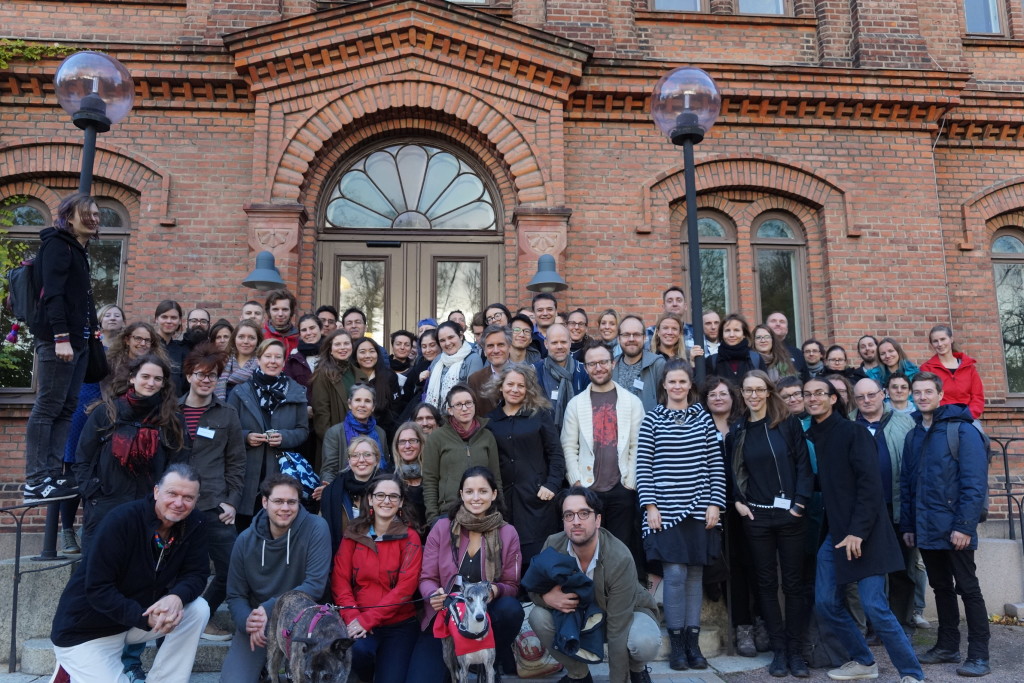Members of EACAS
Dr. Elisa Aaltola (Finland) Elisa Aaltola, PhD, is a Senior Lecturer in Philosophy at the University of Eastern  Finland (Senior Research Fellow from the beginning of 2016). She has published circa 35 peer-reviewed papers, three monographs and three edited volumes on animal philosophy, both in English and Finnish. Aaltola’s research has focused on analytic animal ethics, and more recently on moral psychology in human-nonhuman relations (including themes such as empathy, denial and akrasia), the notion of “animal suffering”, limits of propositional language in comprehending animality, and skepticism over nonhuman minds. Her books include Animal Suffering: Philosophy and Culture (Palgrave MacMillan 2012) and Animal Ethics and Philosophy: Questioning the Orthodoxy (co-edited with John Hadley, Rowman & Littlefield 2014). Aaltola has taught animal ethics and animal philosophy in various courses and public lectures throughout the years, and maintains a Finnish blog in order to introduce vegan themes to broader audiences. She is currenty working on books on ineffable understanding of nonhuman creatures; empathy in the context of animal philosophy; akrasia; and existential takes on human/animal identity.
Finland (Senior Research Fellow from the beginning of 2016). She has published circa 35 peer-reviewed papers, three monographs and three edited volumes on animal philosophy, both in English and Finnish. Aaltola’s research has focused on analytic animal ethics, and more recently on moral psychology in human-nonhuman relations (including themes such as empathy, denial and akrasia), the notion of “animal suffering”, limits of propositional language in comprehending animality, and skepticism over nonhuman minds. Her books include Animal Suffering: Philosophy and Culture (Palgrave MacMillan 2012) and Animal Ethics and Philosophy: Questioning the Orthodoxy (co-edited with John Hadley, Rowman & Littlefield 2014). Aaltola has taught animal ethics and animal philosophy in various courses and public lectures throughout the years, and maintains a Finnish blog in order to introduce vegan themes to broader audiences. She is currenty working on books on ineffable understanding of nonhuman creatures; empathy in the context of animal philosophy; akrasia; and existential takes on human/animal identity.
Dr. Kadri Aavik (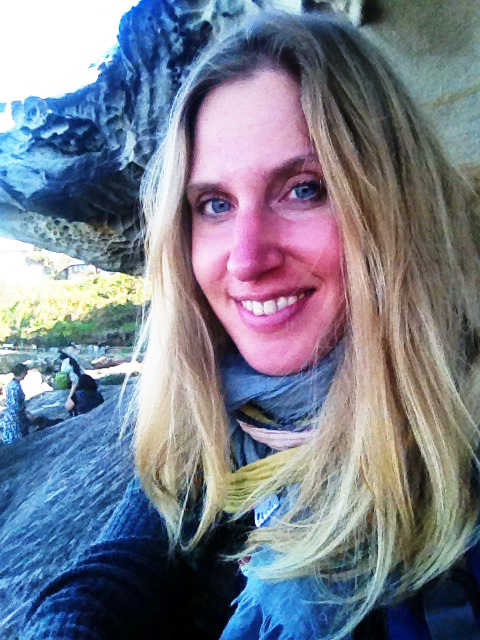 Estonia) Kadri Aavik, PhD, is a Lecturer in Sociology at the School of Governance, Law and Society in Tallinn University, Estonia. Her recently defended PhD dissertation focused on inequalities in the Estonian labour market, which she studied using an intersectional approach. Kadri is interested in possibilities to challenge anthropocentric intersectional frameworks to include species as a category of oppression among others. She is active in the Estonian animal rights and vegan movements and is working to introduce perspectives of critical animal studies into academic research in the post-socialist space. She has conducted empirical research on the views of feminists towards animal liberation and veganism (will be published in the next issue of the Journal for Critical Animal Studies). She is currently working on studying the AR movement in the Baltic countries from an intersectional perspective.
Estonia) Kadri Aavik, PhD, is a Lecturer in Sociology at the School of Governance, Law and Society in Tallinn University, Estonia. Her recently defended PhD dissertation focused on inequalities in the Estonian labour market, which she studied using an intersectional approach. Kadri is interested in possibilities to challenge anthropocentric intersectional frameworks to include species as a category of oppression among others. She is active in the Estonian animal rights and vegan movements and is working to introduce perspectives of critical animal studies into academic research in the post-socialist space. She has conducted empirical research on the views of feminists towards animal liberation and veganism (will be published in the next issue of the Journal for Critical Animal Studies). She is currently working on studying the AR movement in the Baltic countries from an intersectional perspective.
Dr. Núria Almiron (Spain) Núria Almiron is Associate Professor of Communication at the Universitat Pompeu Fabra in Barcelona, Spain. Her  main research topics are focused on the political economy of communication, the ethics of mediation, discourse analysis, and interest groups and advocacy addressing critical animal issues. Her work has appeared in Journalism Studies, Environmental Communication, International Journal of Communication, International Communication Gazette, Triple-C, American Behavioral Scientis, and others. She is the co-editor of Critical Animal and Media Studies (Routledge, 2015 with Matthew Cole and Carrie P. Freeman), and coordinator of the MA in International Studies on Media, Power, and Difference. For more, see www.almiron.org.
main research topics are focused on the political economy of communication, the ethics of mediation, discourse analysis, and interest groups and advocacy addressing critical animal issues. Her work has appeared in Journalism Studies, Environmental Communication, International Journal of Communication, International Communication Gazette, Triple-C, American Behavioral Scientis, and others. She is the co-editor of Critical Animal and Media Studies (Routledge, 2015 with Matthew Cole and Carrie P. Freeman), and coordinator of the MA in International Studies on Media, Power, and Difference. For more, see www.almiron.org.
 Dr. Onur Alptekin, PhD., (Turkey) is currently an independent researcher. His recently defended PhD dissertation, entitled “Machine-Bodies to the Horsepower: Ungulate Labour in Industrial Production in the Atlantic World, 1554-1782”, analyzed the early modern history of animal labor in the accumulation of capital and appropriation of wealth and its relation to the change in mentalities regarding bodies and labor. Alptekin is interested in the Marxist analysis of animal labor and the history of colonialism. His research interests include historical sociology, genealogy of knowledge, and history of mentalities. His most recent paper, which covers dog labor in early modern Atlantic world, will be published in the Spring 2024 issue of the Journal of Animal Ethics. He presented papers in conferences in Turkey, England, Sweden, Cuba, and Trinidad and Tobago.
Dr. Onur Alptekin, PhD., (Turkey) is currently an independent researcher. His recently defended PhD dissertation, entitled “Machine-Bodies to the Horsepower: Ungulate Labour in Industrial Production in the Atlantic World, 1554-1782”, analyzed the early modern history of animal labor in the accumulation of capital and appropriation of wealth and its relation to the change in mentalities regarding bodies and labor. Alptekin is interested in the Marxist analysis of animal labor and the history of colonialism. His research interests include historical sociology, genealogy of knowledge, and history of mentalities. His most recent paper, which covers dog labor in early modern Atlantic world, will be published in the Spring 2024 issue of the Journal of Animal Ethics. He presented papers in conferences in Turkey, England, Sweden, Cuba, and Trinidad and Tobago.
Paula Arcari, PhD (Australia), is a research officer within the Centre for Urban Research at RMIT University, Melbourne. She completed her PhD in July 2018 and holds two Masters in Geography and Environmental Science from Monash University and the University of Edinburgh, Scotland. Paula previously worked with ICLEI Oceania on a range of climate change mitigation and adaptation projects for local governments across Australia before joining RMIT’s Centre for Design where she remained until the commencement of her PhD. Paula has an interdisciplinary background, encompassing both quantitative and qualitative approaches and methods, and is interested in how both societal change and stability are constituted. Her PhD research was a Foucauldian exploration of how ‘meat’ and ‘food’ animals are ‘made sense of’ in everyday social practices. Continuing this theme, Paula’s current focus is understanding how to challenge habitual ways of thinking and acting about nonhuman animals using a critically posthuman approach.
Dr. Susan Askew left her role as MA course leader in Education at UCL last year after 31 years of teaching there. Here specialisms include pedagogy and curriculum. She also supervised research students. At UCL she sought to incorporate a focus on veganism and animal liberation in her teaching and make links between the ideologies that rationalise injustices to human and non human animals. Currently she is studying an MA in Fine Art at Camberwell College of Art. This is a research-practice based degree and her research focuses on what can be learned about using drawing to interrupt the violent iconography of other animals, particularly of farmed animals.
Amanda Baker (UK) 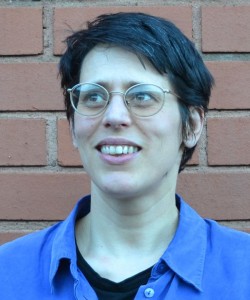 Amanda Baker is the Senior Advocacy and Policy Officer, in the Campaigns team, at The Vegan Society. They use the best available evidence to lobby policy-makers on solutions avoiding use of non-human animals for any purpose. As Advocacy Officer, Amanda Baker also supports vegans in vulnerable situations. This work is grounded in the Universal Declaration of Human Rights, with advice informed in part by the work of Jeanette Rowley and the International Vegan Rights Alliance. Particular research interests include: The praxis of pro-intersectional leadership in the vegan and animal liberation movements; Effective communication of the dependency upon human liberation of the goal to end human exploitation of non-humans.
Amanda Baker is the Senior Advocacy and Policy Officer, in the Campaigns team, at The Vegan Society. They use the best available evidence to lobby policy-makers on solutions avoiding use of non-human animals for any purpose. As Advocacy Officer, Amanda Baker also supports vegans in vulnerable situations. This work is grounded in the Universal Declaration of Human Rights, with advice informed in part by the work of Jeanette Rowley and the International Vegan Rights Alliance. Particular research interests include: The praxis of pro-intersectional leadership in the vegan and animal liberation movements; Effective communication of the dependency upon human liberation of the goal to end human exploitation of non-humans.
Will Boisseau (UK) Will is a PhD student at Loughborough University. His research focuses on the place of animal advocacy within the British left, particularly on the relationship between the anarchistic/direct action and legislative wings of the movement. Through this research he explores a range of concepts including speciesism, total liberation and intersectionality. He is also interested in locating a class analysis within Critical Animal Studies. Will is a member of the Anarchism Research Group and his research interests include Anarchist Studies, Critical Animal Studies, Labour History, Social Movement Studies and Morrissey Studies.
Livia Boscardin (Switzerland) Livia is a PhD student in Sociology at the University of Basel, Switzerland. Her work critically examines the nexus animals and sustainable development/green capitalism by investigating green policies and the intersectionality of oppression in the animal-industrial complex, with a focus on the FAO’s livestock revolution. Livia’s interests include CAS, political ecology, anarchist and Critical Theory, eco/transfeminism, and militant research. She worked for the PhD-program Law and Animals in Basel and spent the Spring term of 2015 at the Animal Studies Initiative, NYU. In Basel and NYC, she’s primarily engaged in animal rights and prisoner support collectives. E-Mail: livia.boscardin@unibas.ch
animals and sustainable development/green capitalism by investigating green policies and the intersectionality of oppression in the animal-industrial complex, with a focus on the FAO’s livestock revolution. Livia’s interests include CAS, political ecology, anarchist and Critical Theory, eco/transfeminism, and militant research. She worked for the PhD-program Law and Animals in Basel and spent the Spring term of 2015 at the Animal Studies Initiative, NYU. In Basel and NYC, she’s primarily engaged in animal rights and prisoner support collectives. E-Mail: livia.boscardin@unibas.ch
Leonie Bossert (Germany) 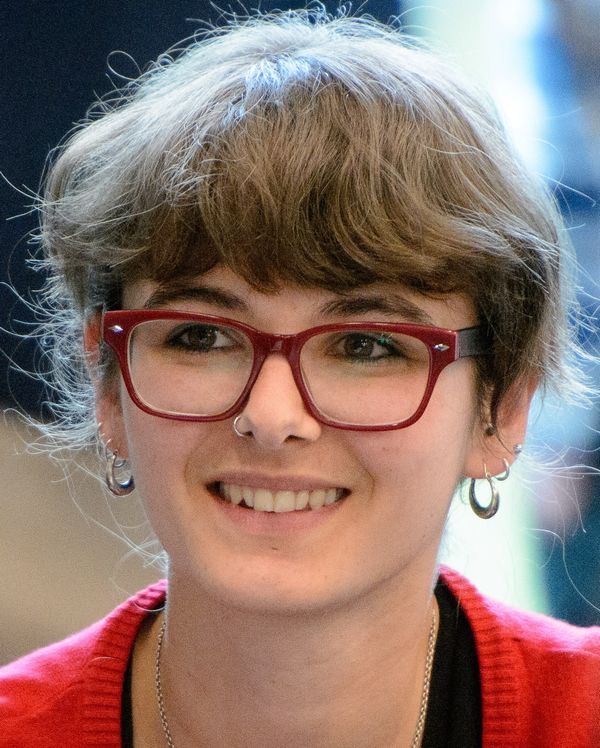 Leonie is a PhD student in Ethics at the University of Tuebingen, Germany. Her PhD project is about developing a normative theory of sustainable development which includes nonhuman animals and is no longer anthropocentric. Leonie is teaching animal ethics, environmental ethics and ethical foundations of sustainability at the University of Tuebingen and the University of Landau. She published several articles, edited volumes and a monography on animal ethics and human-animal studies. Leonie’s main research interests are animal ethics, critical animal studies, environmental ethics, feminism and gender studies. She is a member of the German animal rights group ‘Die Tierbefreier’.
Leonie is a PhD student in Ethics at the University of Tuebingen, Germany. Her PhD project is about developing a normative theory of sustainable development which includes nonhuman animals and is no longer anthropocentric. Leonie is teaching animal ethics, environmental ethics and ethical foundations of sustainability at the University of Tuebingen and the University of Landau. She published several articles, edited volumes and a monography on animal ethics and human-animal studies. Leonie’s main research interests are animal ethics, critical animal studies, environmental ethics, feminism and gender studies. She is a member of the German animal rights group ‘Die Tierbefreier’.
Dr. Leonardo Caffo (Italy) 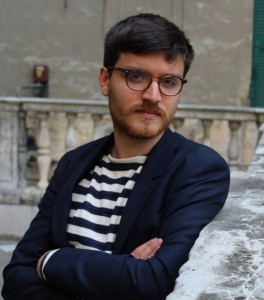 Leonardo Caffo, PhD, is Post-doctoral Fellow in Philosophy at the University of Turin, where he is also member of the LabOnt (Laboratory for Ontology) and coordinator of Labont|Arch. He has been Fellow of the Oxford Centre for Animal Ethics (Oxford) and visiting scholar of Jawaharlal Nehru University, (New Delhi, India). He has also been Chief of Seminar (Animal Philosophy) with DAAD Program at the University of Kassel (Germany) and visiting professor at Politecnico di Milano (Facoltà di Architettura). He is a columnist for ‘Huffington Post Italy’, ‘La Sicilia’ and ‘Corriere della Sera’ (La Lettura), the Co-director of ‘Animot: l’altra filosofia’, and the founder and past-director of ‘Animal Studies’ and the ‘Rivista Italiana di Filosofia Analitica Jr” and his is also founder of “Gallinae in Fabula Onlus”. His most recent publications include: Il maiale non fa la rivoluzione (2013), Naturalism and Constructivism in Metaethics (2014), Only for Them, preface to Matthew Calarco and Melanie Joy, (2014), A come Animale (2015), An Art for the Other, preface to Steve Baker, (2015), and Il bosco interiore (2015). Leonardo Caffo has worked in the field of social ontology and realism, animal studies and cognition, applied ethics, and philosophy of anarchism and architecture (in both analytic and continental traditions). Attaching is name to the theory of “antispecismo debole” (weak antispeciesism), he won the “Premio Nazionale Frascati Filosofia” (2015).
Leonardo Caffo, PhD, is Post-doctoral Fellow in Philosophy at the University of Turin, where he is also member of the LabOnt (Laboratory for Ontology) and coordinator of Labont|Arch. He has been Fellow of the Oxford Centre for Animal Ethics (Oxford) and visiting scholar of Jawaharlal Nehru University, (New Delhi, India). He has also been Chief of Seminar (Animal Philosophy) with DAAD Program at the University of Kassel (Germany) and visiting professor at Politecnico di Milano (Facoltà di Architettura). He is a columnist for ‘Huffington Post Italy’, ‘La Sicilia’ and ‘Corriere della Sera’ (La Lettura), the Co-director of ‘Animot: l’altra filosofia’, and the founder and past-director of ‘Animal Studies’ and the ‘Rivista Italiana di Filosofia Analitica Jr” and his is also founder of “Gallinae in Fabula Onlus”. His most recent publications include: Il maiale non fa la rivoluzione (2013), Naturalism and Constructivism in Metaethics (2014), Only for Them, preface to Matthew Calarco and Melanie Joy, (2014), A come Animale (2015), An Art for the Other, preface to Steve Baker, (2015), and Il bosco interiore (2015). Leonardo Caffo has worked in the field of social ontology and realism, animal studies and cognition, applied ethics, and philosophy of anarchism and architecture (in both analytic and continental traditions). Attaching is name to the theory of “antispecismo debole” (weak antispeciesism), he won the “Premio Nazionale Frascati Filosofia” (2015).
Jana Canavan (Germany) studies gender studies with a major in political science at Lund University in Sweden. She is currently writing her master thesis problematising the Swedish ‘milk crisis’ from a critical feminist interspecies perspective to place dairy farming in a wider socio-political spectrum of oppression. Jana holds a BA in Peace and Conflict Studies from Malmö University, Sweden. Her research interests include ecofeminism, critical animal studies, and critical posthumanism.
 Dr Silvia Caprioglio Panizza (Italy) spends a lot of time wondering how to get to the point where animal suffering and oppression is no longer the norm. To that end, she studies animal ethics and moral psychology, offers public engagement talks on our relationships with other animals, and incorporates animal ethics into her teaching. Currently she is Marie Skłodowska Curie Fellow at the Centre for Ethics at the University of Pardubice working on a project on Moral Impossibility (MIGHT) and is a fellow of the Centre for Ethics in Public Life, University College Dublin, where she taught ethics. Previously she was a Lecturer at University of East Anglia, John Cabot University Rome, and Anglia Ruskin University. She is the author of The Ethics of Attention: Engaging the Real with Iris Murdoch and Simone Weil (Routledge 2022) (where the last two chapters talk about animal activism) and has published on moral realism, moral motivation, trust, animal ethics, environmental ethics, and literature & translation. She is interested in spiritual traditions and in poetry. Since 2019 she is the leader of the Vegan Studies Network (VSN) https://veganstudiesnetwork.uea.ac.uk/. Contact: sil.panizza@gmail.com
Dr Silvia Caprioglio Panizza (Italy) spends a lot of time wondering how to get to the point where animal suffering and oppression is no longer the norm. To that end, she studies animal ethics and moral psychology, offers public engagement talks on our relationships with other animals, and incorporates animal ethics into her teaching. Currently she is Marie Skłodowska Curie Fellow at the Centre for Ethics at the University of Pardubice working on a project on Moral Impossibility (MIGHT) and is a fellow of the Centre for Ethics in Public Life, University College Dublin, where she taught ethics. Previously she was a Lecturer at University of East Anglia, John Cabot University Rome, and Anglia Ruskin University. She is the author of The Ethics of Attention: Engaging the Real with Iris Murdoch and Simone Weil (Routledge 2022) (where the last two chapters talk about animal activism) and has published on moral realism, moral motivation, trust, animal ethics, environmental ethics, and literature & translation. She is interested in spiritual traditions and in poetry. Since 2019 she is the leader of the Vegan Studies Network (VSN) https://veganstudiesnetwork.uea.ac.uk/. Contact: sil.panizza@gmail.com
Dr. Ilda Teresa Castro (Portugal)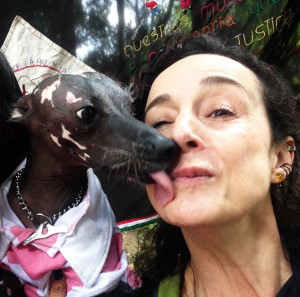 works at the intersection of critical animal studies, environmental studies, and film and cultural studies. She is a Postdoctoral Researcher Fellow member of the Nova Institute of Philosophy (IfilNova), a research unit of the Faculty of Social and Human Sciences of the Universidade Nova de Lisboa. Her PhD, completed in 2012, combines the role that film plays on a ecocritic (in) formation and counsciousness with an arqueology of the Living. She is the author of the books “I Animal – arguments for a new paradigm – cinema and ecology” (2015) and of the trilogy of conversations dedicated to Portuguese cinema “Portuguese Animation” (2004), “Portuguese Women Filmmakers” (2001), ” Portuguese Short-Films” (1999). Graduated in Cinema, Superior School of Theater and Cinema (Lisbon) and in Arts, by Superior School of Decorative Arts, Fundação Ricardo Espírito Santo e Silva, she develops multidisciplinary projects at a crossroad between art and ecology / non-human animals, focusing on the ecocritical, environmental and animal domain. Creator of the online platform and journal Animalia Vegetalia Mineralia — ecocinema, ecomedia and ecocriticism. She is author of several articles and book chapters on Ecocinema and Media Animals.
works at the intersection of critical animal studies, environmental studies, and film and cultural studies. She is a Postdoctoral Researcher Fellow member of the Nova Institute of Philosophy (IfilNova), a research unit of the Faculty of Social and Human Sciences of the Universidade Nova de Lisboa. Her PhD, completed in 2012, combines the role that film plays on a ecocritic (in) formation and counsciousness with an arqueology of the Living. She is the author of the books “I Animal – arguments for a new paradigm – cinema and ecology” (2015) and of the trilogy of conversations dedicated to Portuguese cinema “Portuguese Animation” (2004), “Portuguese Women Filmmakers” (2001), ” Portuguese Short-Films” (1999). Graduated in Cinema, Superior School of Theater and Cinema (Lisbon) and in Arts, by Superior School of Decorative Arts, Fundação Ricardo Espírito Santo e Silva, she develops multidisciplinary projects at a crossroad between art and ecology / non-human animals, focusing on the ecocritical, environmental and animal domain. Creator of the online platform and journal Animalia Vegetalia Mineralia — ecocinema, ecomedia and ecocriticism. She is author of several articles and book chapters on Ecocinema and Media Animals.
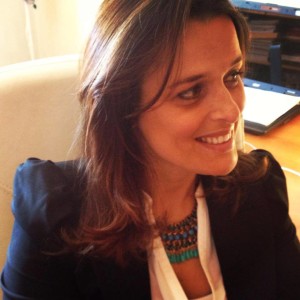 Sandra Teixeira do Carmo (Portugal), has a degree and a master´s degree from the Faculty of Law of the University of Coimbra (FDUC), where she is doing a doctorate about the theme “The nature of our duties towards animals: mere indiret duties or authentic duties of justice?”. She’s interest in applied ethics (animal ethics) in particular in ethics of assisting animals and in the nature of our positive obligations to them. In her research she focuses – based in Clare Palmer´s work – in the importance of Contex, History and Relation(s) as critical ethical factors that based our special obligations to animals. She participated in several conferences in the area of Animal Studies and she’s the responsible for the module of Animal Ethics in the master of Animal Law organised by the Faculty of Law,Lisbon. She’s also the vice-president of Empty Cages – Portuguese and Spanish Association of Animal Law.
Sandra Teixeira do Carmo (Portugal), has a degree and a master´s degree from the Faculty of Law of the University of Coimbra (FDUC), where she is doing a doctorate about the theme “The nature of our duties towards animals: mere indiret duties or authentic duties of justice?”. She’s interest in applied ethics (animal ethics) in particular in ethics of assisting animals and in the nature of our positive obligations to them. In her research she focuses – based in Clare Palmer´s work – in the importance of Contex, History and Relation(s) as critical ethical factors that based our special obligations to animals. She participated in several conferences in the area of Animal Studies and she’s the responsible for the module of Animal Ethics in the master of Animal Law organised by the Faculty of Law,Lisbon. She’s also the vice-president of Empty Cages – Portuguese and Spanish Association of Animal Law.
 Patrycja Chuszcz is a PhD candidate at the Doctoral School of Humanities at the University of Lodz. She is working on a project on the ways of perceiving by viewers film representations of the so-called farm animals. She published, inter alia, in “Zoophilologica. Polish Journal of Animal Studies” and “Images.” She is a co-leader of the NECS Film Animal Studies workgroup, a member of EACAS and an external member of the research group CULIVIAN (Animals in literary and visual cultures) at the University of Valencia.
Patrycja Chuszcz is a PhD candidate at the Doctoral School of Humanities at the University of Lodz. She is working on a project on the ways of perceiving by viewers film representations of the so-called farm animals. She published, inter alia, in “Zoophilologica. Polish Journal of Animal Studies” and “Images.” She is a co-leader of the NECS Film Animal Studies workgroup, a member of EACAS and an external member of the research group CULIVIAN (Animals in literary and visual cultures) at the University of Valencia.
Norma Contreras  (lives in the Netherlands). Norma is a Mexican PhD student in the Netherlands at the University of Twente in the Department of Governance and Technology for Sustainability (CSTM), she frequently travels to Mexico to aid the emergent Mexican pro nonhuman animal movement. Her interests have driven her to develop academic and activist work for more than 10 years. Norma is interested in studying the creation and implementation of nonhuman animal and environmental public policies, leadership and social media impact. She has worked in developing nonhuman animal legislation in Mexico and conducted workshops for public civil servants and society in general. Norma has also participated and organized national and international nonhuman animal forums and conferences, she has aided nonhuman animal NGOs and has rescued many nonhuman animals herself, contact: normacontrerash@yahoo.com and n.contrerashernandez@utwente.nl
(lives in the Netherlands). Norma is a Mexican PhD student in the Netherlands at the University of Twente in the Department of Governance and Technology for Sustainability (CSTM), she frequently travels to Mexico to aid the emergent Mexican pro nonhuman animal movement. Her interests have driven her to develop academic and activist work for more than 10 years. Norma is interested in studying the creation and implementation of nonhuman animal and environmental public policies, leadership and social media impact. She has worked in developing nonhuman animal legislation in Mexico and conducted workshops for public civil servants and society in general. Norma has also participated and organized national and international nonhuman animal forums and conferences, she has aided nonhuman animal NGOs and has rescued many nonhuman animals herself, contact: normacontrerash@yahoo.com and n.contrerashernandez@utwente.nl
Professor Erika Cudworth (UK) Erika is Professor of Feminist Animal Studies and co-chair of the Feminist Research Group in the School of Social Sciences, University of East London, UK. Her research interests include complexity theory, gender, and human relations with non-human animals, particularly theoretical and political challenges to exclusive humanism.Erika’s books include Environment and Society (Routledge, 2003), Developing Ecofeminist Theory: the Complexity of Difference (Palgrave, 2005) Social Lives with Other Animals: Tales of Sex, Death and Love (Palgrave, 2011); Posthuman International Relations: Complexity, Ecologism and International Politics (Zed, 2011, co-authored with Steve Hobden); and Anarchism and Animal Liberation: Essays on Complementary Elements of Total Liberation (McFarland, 2015, co-edited with Richard White and Anthony Nocella). Erika’s current projects are on companion species lives, animals and war and posthuman political theory. She is working on two new books at the moment – The Emancipatory Project of Posthumanism (forthcoming, Routledge, co-authored with Steve Hobden) and Animalizing Sociology (forthcoming, Ashgate, co-authored with Matthew Cole).
 Emilie Dardenne (France) is currently senior lecturer in English at the université Rennes 2, France. She holds a doctorate in English as well as the agrégation d’anglais. She has published articles on animal ethics, utilitarianism, and the works of Frances Power Cobbe, Henry Stephens Salt as well as Peter Singer. She has coorganised several international conferences and directed three collective volumes (among which Deux siècles d’utilitarisme, with Malik Bozzo-Rey, P.U.R, 2011; and Peter Singer et La libération animale. Quarante ans plus tard, P.U.R., 2017, with Valéry Giroux and Enrique Utria).
Emilie Dardenne (France) is currently senior lecturer in English at the université Rennes 2, France. She holds a doctorate in English as well as the agrégation d’anglais. She has published articles on animal ethics, utilitarianism, and the works of Frances Power Cobbe, Henry Stephens Salt as well as Peter Singer. She has coorganised several international conferences and directed three collective volumes (among which Deux siècles d’utilitarisme, with Malik Bozzo-Rey, P.U.R, 2011; and Peter Singer et La libération animale. Quarante ans plus tard, P.U.R., 2017, with Valéry Giroux and Enrique Utria).
Karolina Echaust (Poland) is a cultural anthropologist. Ph. D. Candidate in Cultural Anthropology at Adam Mickiewicz University in Poznań. She deals with Environmental anthropology and multispecies relations, “ethnography of global connections”, More-than-Human-World , Human-Animal Studies. The main term is multispecies relations between peoples and bees in tree beekeeping culture in Poland and Belarus. She is interested in tree-beekeeping in the cultural anthropology context. She worked in many anthropological research projects about cultural and natural heritage, urban anthropology, museums in Poland, and the United Kingdom.
cultural anthropologist. Ph. D. Candidate in Cultural Anthropology at Adam Mickiewicz University in Poznań. She deals with Environmental anthropology and multispecies relations, “ethnography of global connections”, More-than-Human-World , Human-Animal Studies. The main term is multispecies relations between peoples and bees in tree beekeeping culture in Poland and Belarus. She is interested in tree-beekeeping in the cultural anthropology context. She worked in many anthropological research projects about cultural and natural heritage, urban anthropology, museums in Poland, and the United Kingdom.
Also, she is membership the Polish Ethnological Society. She was a volunteer in the British Museum, Museum of Archaeology and Anthropology in Cambridge, Royal Anthropological Institute of Great Britain and Ireland in London, United Kingdom, and the National Army Museum in London Stevenage, in the United Kingdom
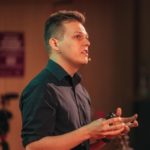 Stuart Evans (UK), a passionate activist, dedicates himself to environmental and animal liberation. Specializing in Critical Animal Studies and Environmental Philosophy (Ecosophy), he is a notable public speaker, addressing TEDx and other significant platforms on morality and ethics. Stuart’s work focuses on animal liberation and the complex relationship between humanity and animality. His recent research explores Enrique Dussel’s Philosophy of Liberation, understanding the Bio-periphery’s struggle in the global capitalist structure. Challenging Anthropocentric and Eurocentric norms, he redefines Western moral considerations for animals, emphasizing essential interdependence between humans and non-human animals. Stuart promotes a decolonised form of animal liberation and promotes a biocentric ethic. His diverse interests include Critical Animal Theory, Post-Humanism, Decolonial Studies, and Environmental Philosophy, influencing ongoing discussions around animal liberation over welfarism. He fervently challenges Neo-colonial and Capitalist meta-narratives, advocating for environmental justice and the liberation of all beings. He works at the Environmental Alliance Project (www.eap.eco), and also its sister organisation, the Animal Alliance Project.
Stuart Evans (UK), a passionate activist, dedicates himself to environmental and animal liberation. Specializing in Critical Animal Studies and Environmental Philosophy (Ecosophy), he is a notable public speaker, addressing TEDx and other significant platforms on morality and ethics. Stuart’s work focuses on animal liberation and the complex relationship between humanity and animality. His recent research explores Enrique Dussel’s Philosophy of Liberation, understanding the Bio-periphery’s struggle in the global capitalist structure. Challenging Anthropocentric and Eurocentric norms, he redefines Western moral considerations for animals, emphasizing essential interdependence between humans and non-human animals. Stuart promotes a decolonised form of animal liberation and promotes a biocentric ethic. His diverse interests include Critical Animal Theory, Post-Humanism, Decolonial Studies, and Environmental Philosophy, influencing ongoing discussions around animal liberation over welfarism. He fervently challenges Neo-colonial and Capitalist meta-narratives, advocating for environmental justice and the liberation of all beings. He works at the Environmental Alliance Project (www.eap.eco), and also its sister organisation, the Animal Alliance Project.
Laura Fernández  (Spain) is a Juan de la Cierva Postdoctoral fellow in the Department of Library and Information Science and Audiovisual Communication at Barcelona University. She holds a PhD in Communication from Pompeu Fabra University (Barcelona, 2021), she previously graduated in Social and Cultural Anthropology (Autonomous University of Madrid, 2016) and completed a master’s degree in International Studies on Media, Power and Difference (Pompeu Fabra University, 2017). Her PhD thesis was entitled: “Images that liberate. Moral shock and strategic visual communication in animal liberation activism” and offered a thorough qualitative analysis of the reception and use of visual communication strategies within the animal advocacy movement in Denmark, Sweden and Spain. Her research areas mainly include critical animal and media studies, strategic visual communication, interest groups, social movement studies, media representation of oppressed groups, and fat, feminist & LGTBI+ studies. She is the author of more than ten academic publications and the book Hacia mundos más animales (Towards more animal worlds). Laura is part of the COMPASS Research Project (“Lobbying and Compassion. Interest groups, discourse and nonhuman animals in Spain”) and a board member of the UPF-Centre for Animal Ethics.
(Spain) is a Juan de la Cierva Postdoctoral fellow in the Department of Library and Information Science and Audiovisual Communication at Barcelona University. She holds a PhD in Communication from Pompeu Fabra University (Barcelona, 2021), she previously graduated in Social and Cultural Anthropology (Autonomous University of Madrid, 2016) and completed a master’s degree in International Studies on Media, Power and Difference (Pompeu Fabra University, 2017). Her PhD thesis was entitled: “Images that liberate. Moral shock and strategic visual communication in animal liberation activism” and offered a thorough qualitative analysis of the reception and use of visual communication strategies within the animal advocacy movement in Denmark, Sweden and Spain. Her research areas mainly include critical animal and media studies, strategic visual communication, interest groups, social movement studies, media representation of oppressed groups, and fat, feminist & LGTBI+ studies. She is the author of more than ten academic publications and the book Hacia mundos más animales (Towards more animal worlds). Laura is part of the COMPASS Research Project (“Lobbying and Compassion. Interest groups, discourse and nonhuman animals in Spain”) and a board member of the UPF-Centre for Animal Ethics.
Dr. Arianna Ferrari 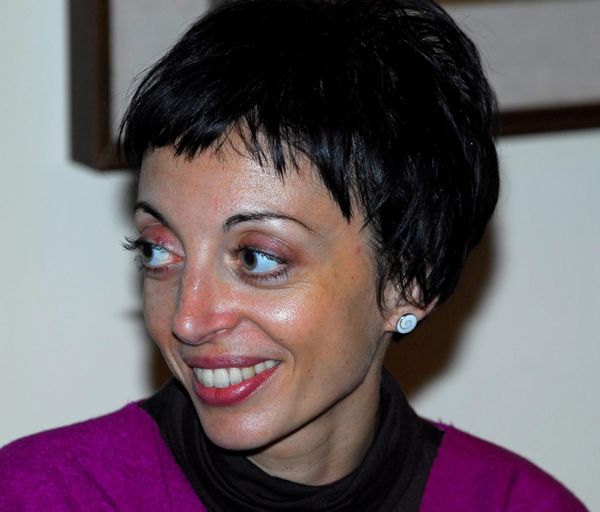 (Germany/Italy), PhD in philosophy, is a Senior Scientist and Head of the Research Area “Innovation processes and impacts of technology” at the Institute for Technology Assessment and Systems Analysis (ITAS) at the KIT – the Research University in the Helmholtz Association in Karlsruhe, Germany. She has published different peer-reviewed papers, and edited volumes as well as a monograph on animal philosophy, both in English and German. Ferrari’s research has focused on animal ethics, animal experiments, genetic engineering of animals and the role of technological innovations in shaping human-animal relationships. Her books include her dissertation on ethical and epistemic aspects of genetic engineering of animals in biomedical research in German (Genmaus & Co, 2008), a study on animal enhancement commissioned by the Swiss Federal Ethics Committee on Non-human Biotechnology (“Animal Enhancement 2010, http://www.ekah.admin.ch/de/externe-gutachten/buchreihe-beitraege-zur-ethik-und-biotechnologie/animal-enhancement-neue-technische-moeglichkeiten-und-ethische-fragen/ ) and the first German Handbook on Human-animal Relationships (co-edited with Klaus Petrus, Transcript, 2015). She has taught animal ethics and animal philosophy in various courses and public lectures. She is raising the interests for questions concerning animals in fields usually ignoring them such as philosophy of technology and technology assessment. She is currently working on a project founded by the German Ministry of Research and Education on “visions of in-vitro meat – Analysis of the technical and social aspects and visions of in vitro meat (VIF) (invitrofleisch.info)“ and on a project on animals in technosciences which she hopes to hand for the “habilitation” degree (Professorship) in Germany.
(Germany/Italy), PhD in philosophy, is a Senior Scientist and Head of the Research Area “Innovation processes and impacts of technology” at the Institute for Technology Assessment and Systems Analysis (ITAS) at the KIT – the Research University in the Helmholtz Association in Karlsruhe, Germany. She has published different peer-reviewed papers, and edited volumes as well as a monograph on animal philosophy, both in English and German. Ferrari’s research has focused on animal ethics, animal experiments, genetic engineering of animals and the role of technological innovations in shaping human-animal relationships. Her books include her dissertation on ethical and epistemic aspects of genetic engineering of animals in biomedical research in German (Genmaus & Co, 2008), a study on animal enhancement commissioned by the Swiss Federal Ethics Committee on Non-human Biotechnology (“Animal Enhancement 2010, http://www.ekah.admin.ch/de/externe-gutachten/buchreihe-beitraege-zur-ethik-und-biotechnologie/animal-enhancement-neue-technische-moeglichkeiten-und-ethische-fragen/ ) and the first German Handbook on Human-animal Relationships (co-edited with Klaus Petrus, Transcript, 2015). She has taught animal ethics and animal philosophy in various courses and public lectures. She is raising the interests for questions concerning animals in fields usually ignoring them such as philosophy of technology and technology assessment. She is currently working on a project founded by the German Ministry of Research and Education on “visions of in-vitro meat – Analysis of the technical and social aspects and visions of in vitro meat (VIF) (invitrofleisch.info)“ and on a project on animals in technosciences which she hopes to hand for the “habilitation” degree (Professorship) in Germany.
Dr Lauren Harris (UK): 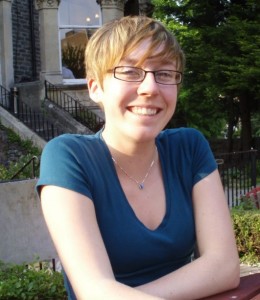 I am a researcher at the UK canine welfare charity, Dogs Trust. I previously completed a PhD in canine emotion and chronic pain at the University of Bristol. My interests lie in improving the scientific rigour of animal advocacy campaigns, and encouraging human behaviour change to benefit non-human animals. In my current role at Dogs Trust I provide scientific support to the campaigns team; helping them to review evidence, analyse data, and measure campaign impact and human behaviour change.
I am a researcher at the UK canine welfare charity, Dogs Trust. I previously completed a PhD in canine emotion and chronic pain at the University of Bristol. My interests lie in improving the scientific rigour of animal advocacy campaigns, and encouraging human behaviour change to benefit non-human animals. In my current role at Dogs Trust I provide scientific support to the campaigns team; helping them to review evidence, analyse data, and measure campaign impact and human behaviour change.
Kathrin Herrmann (Germany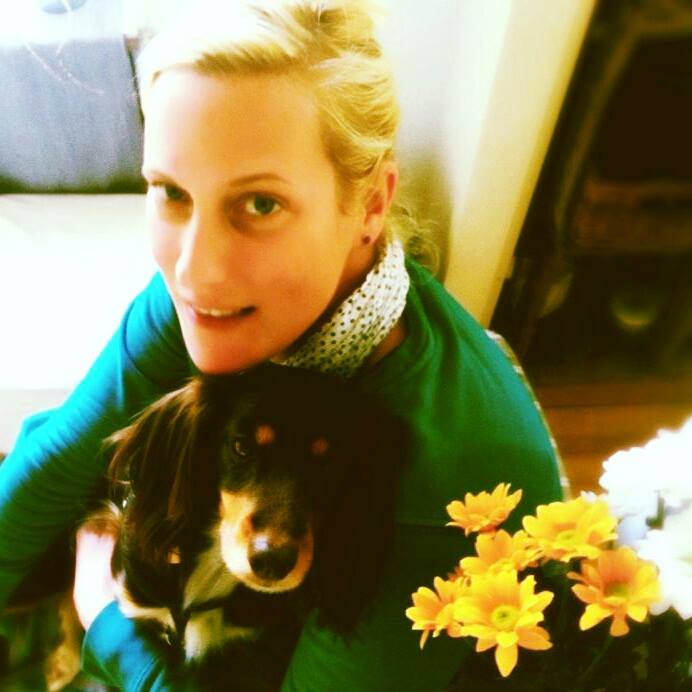 ) Kathrin is a veterinary specialist in Animal Welfare Science and Ethics. She has been an animal advocate since early childhood which led to the decision to become a veterinarian. During her veterinary degree, which involved studies in Berlin, Germany and Zürich, Switzerland, she was engaged in many animal protection issues. Animal experimentation has been a primary focus since she became a research fellow at the Animals Scientific Procedures Inspectorate in Berlin in October 2007. From March 2012 till March 2015 she worked on her Ph.D. thesis at the Institute of Pharmacology and Toxicology at the School of Veterinary Medicine, Free University Berlin. Her research involves reviewing German project license applications involving rodents to determine whether all refinement measures are employed to reduce animal suffering to the absolute minimum. Her other interests relate to advocating for openness and public engagement in animal experimentation and for humane education. She also raises awareness for the important role veterinarians should play in animal advocacy and protection and promotes a cruelty-free, vegan, and sustainable lifestyle. Her latest project is a book on the ethics of animal experimentation with the focus on how to work towards a paradigm change.
) Kathrin is a veterinary specialist in Animal Welfare Science and Ethics. She has been an animal advocate since early childhood which led to the decision to become a veterinarian. During her veterinary degree, which involved studies in Berlin, Germany and Zürich, Switzerland, she was engaged in many animal protection issues. Animal experimentation has been a primary focus since she became a research fellow at the Animals Scientific Procedures Inspectorate in Berlin in October 2007. From March 2012 till March 2015 she worked on her Ph.D. thesis at the Institute of Pharmacology and Toxicology at the School of Veterinary Medicine, Free University Berlin. Her research involves reviewing German project license applications involving rodents to determine whether all refinement measures are employed to reduce animal suffering to the absolute minimum. Her other interests relate to advocating for openness and public engagement in animal experimentation and for humane education. She also raises awareness for the important role veterinarians should play in animal advocacy and protection and promotes a cruelty-free, vegan, and sustainable lifestyle. Her latest project is a book on the ethics of animal experimentation with the focus on how to work towards a paradigm change.
Marvin Giehl (Germany)  studied pedagogy in Trier and Dortmund and is currently working as a scientific assistant at the University of Dortmund. Besides lecturing, he is working on his PhD, which focuses on the role of education in human and nonhuman-relationships. In this context, he conducted several qualitative interviews with vegetarian and vegan people and investigates, why and how their attitude and behavior towards nonhuman animals changed biographically and how this can be analyzed from a standpoint of educational theory. Marvins other main research interests include critical education, education and sustainability, critical theory, education and socialization, transculturality and pedagogical anthropology. Visit https://iaeb.ep.tu-dortmund.de/marvin-giehl/ for further information and contact.
studied pedagogy in Trier and Dortmund and is currently working as a scientific assistant at the University of Dortmund. Besides lecturing, he is working on his PhD, which focuses on the role of education in human and nonhuman-relationships. In this context, he conducted several qualitative interviews with vegetarian and vegan people and investigates, why and how their attitude and behavior towards nonhuman animals changed biographically and how this can be analyzed from a standpoint of educational theory. Marvins other main research interests include critical education, education and sustainability, critical theory, education and socialization, transculturality and pedagogical anthropology. Visit https://iaeb.ep.tu-dortmund.de/marvin-giehl/ for further information and contact.
Dr. Colin Goldner (Germany) Colin Goldner, clinical psychologist. Co-Founder of the animal rights organisation “rage&reason” in 2004, and scientific advisor to a sanctuary for big dogs in Lower Bavaria. Member of the “Gesellschaft für Primatologie”. In 2011 appointed to set up a relaunch of the Great Ape Project, initiated 1993 by the philosophers Peter Singer and Paola Cavalieri. Extensive research on the situation of great apes in German zoos, published in 2014 (“Lebenslänglich hinter Gittern”, Alibri, Aschaffenburg). Currently research on zoos, in general. Several publications on animal rights issues (TierEthik, Tierstudien etc.)
Rich Gorman (UK) is a PhD cand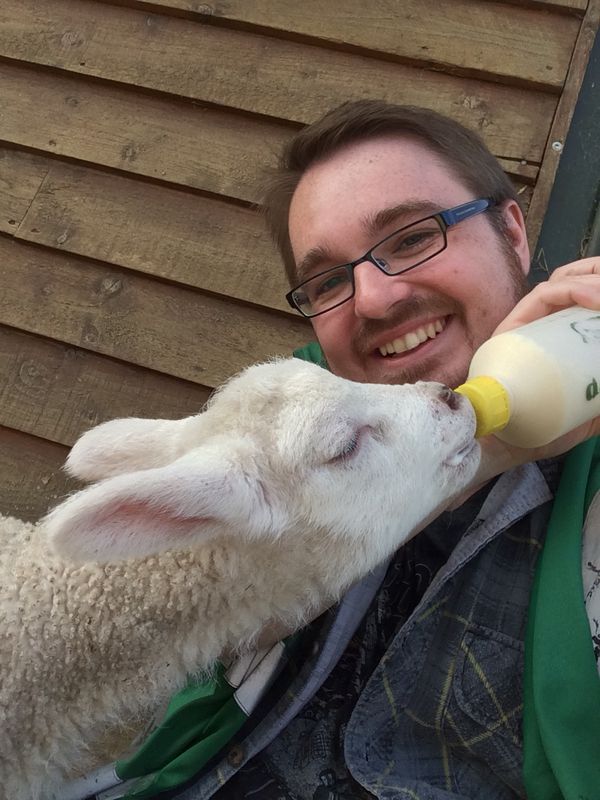 idate in Geography at Cardiff University. Rich is interested in the uses of animals within structured care farming practices, and how animal life can help create a space of positive health and wellbeing for vulnerable people. Rich’s research seeks to develop a critical understanding of the role of non-humans within geographies of therapeutic spaces; exploring how animals’ positioning within these landscapes can be ambiguous and unstable. Rich’s research also cross-cuts into examining local and alternative food networks, particularly Community Supported Agriculture schemes, and the contested roles of animals within these projects.
idate in Geography at Cardiff University. Rich is interested in the uses of animals within structured care farming practices, and how animal life can help create a space of positive health and wellbeing for vulnerable people. Rich’s research seeks to develop a critical understanding of the role of non-humans within geographies of therapeutic spaces; exploring how animals’ positioning within these landscapes can be ambiguous and unstable. Rich’s research also cross-cuts into examining local and alternative food networks, particularly Community Supported Agriculture schemes, and the contested roles of animals within these projects.
Julia Gutjahr  (Diplom Soziologin) is a sociologist and a member of the Group for Society and Animals Studies, located at the Institute of Sociology at the University of Hamburg, Germany. Her research interests are: Ambivalences in the human-animal relationship, violence on animals, farm animals and work, meat consumption, gender studies and social theory.
(Diplom Soziologin) is a sociologist and a member of the Group for Society and Animals Studies, located at the Institute of Sociology at the University of Hamburg, Germany. Her research interests are: Ambivalences in the human-animal relationship, violence on animals, farm animals and work, meat consumption, gender studies and social theory.
Currently, she is working on her dissertation about the construction of gender in the context of the ambivalence of human-animal relationships among lifestock veterinarians.
A list of talks an publications can be found at: http://www.wiso.uni-hamburg.de/professuren/sozialstrukturanalyse/doctoral-students/julia-gutjahr/
Gemma Huckerby (France) is a PhD candidate at the University Paris VIII, Saint-Denis. Their work deconstructs the human-animal binary as an intrinsic basis for the genesis of “western” cosmologies of domination, and origin of the “Anthropocene/Capitalocene” and its catastrophic consequences. It proposes to reconstitute the beginnings of possible multi-species cosmologies and omni-social justice (for the society of all living things), and to develop notions of viable alternatives focused on multi-species symbiotic relationships, which are ecological, social and political. A particular focus is the mutability of subjectivity and agency that can occur through engagement in anti-domination struggles, as well as the new ways of imagining “coexistence” that can arise from these processes. Methodologically the work includes: a critical historical analysis of the non-linearity of human-more than human history; (auto)ethographic exploration of both “western” and indigenous cosmologies of non/domination; and the production of speculative fiction. Their work is situated within critical/radical animal studies, anthrozoology, animalist theory, multi-species inter-relationality, queer theory, the history of animalism and anarchist studies. Gemma is associated with the Laboratory for Gender and Sexuality Studies (LEGS) at the University of Paris VIII, and the Laboratory of Social and Cultural Anthropology (LASC) at the University of Liège via their co-direction. They hold Master’s degrees in Anthrozoology, Political Science, International Relations, with previous research into animalist sanctuaries (forthcoming).
Gabriela Jarzębowska (Poland) is a PhD cand idate at the faculty of Artes Liberales, University of Warsaw, a Junior Visiting Scholar at the Seedbox Mistra-Formas Environmental Humanities Collaboratory based at the Linköping University, Sweden (2016) and a Fulbright Fellow at the Wesleyan University (2018-19). She is interested in how cultural norms work and how notions of purity, borders, exclusion and abjection shape our relations with a non-human world. In her current research project she examines public discourse regarding eradication of animals considered an epidemiological, economic or ecological danger. The purpose of her research is to see how this sort of practices may both reflect and shape attitudes towards particular species, especially in relation to social fears about certain animals. She believes that in the context of global environmental crisis, the humanities must take a stand and develop new methods of analysis aimed at rethinking humans’ place in the world, as well as propose theoretical models for constructive solutions to bring about change.
idate at the faculty of Artes Liberales, University of Warsaw, a Junior Visiting Scholar at the Seedbox Mistra-Formas Environmental Humanities Collaboratory based at the Linköping University, Sweden (2016) and a Fulbright Fellow at the Wesleyan University (2018-19). She is interested in how cultural norms work and how notions of purity, borders, exclusion and abjection shape our relations with a non-human world. In her current research project she examines public discourse regarding eradication of animals considered an epidemiological, economic or ecological danger. The purpose of her research is to see how this sort of practices may both reflect and shape attitudes towards particular species, especially in relation to social fears about certain animals. She believes that in the context of global environmental crisis, the humanities must take a stand and develop new methods of analysis aimed at rethinking humans’ place in the world, as well as propose theoretical models for constructive solutions to bring about change.
Dr. Kimberley Jayne (UK)  Kimberley Jayne has a PhD in Animal Behaviour from the University of Exeter and is now working as a Senior Science Researcher within Animal Defenders International. She comes from a background of working with wild and captive animals in behavioural and welfare research and education. Her experience of captive animal industries led her to the animal protection movement, and toward research that promotes the end of animal use. She is an active campaigner against the industries she once worked for and an advocate of using science to educate others in adopting more compassionate lifestyles. Her current project is a book on the ethics of animal research with a focus on how to work towards a change of paradigm.
Kimberley Jayne has a PhD in Animal Behaviour from the University of Exeter and is now working as a Senior Science Researcher within Animal Defenders International. She comes from a background of working with wild and captive animals in behavioural and welfare research and education. Her experience of captive animal industries led her to the animal protection movement, and toward research that promotes the end of animal use. She is an active campaigner against the industries she once worked for and an advocate of using science to educate others in adopting more compassionate lifestyles. Her current project is a book on the ethics of animal research with a focus on how to work towards a change of paradigm.
Dr. Wahida Khandker (UK) Wahida Khandker is Senior Lecturer in Philosophy in the Department of History, Politics, and Philosophy at Manchester Metropolitan University. Her research explores the intersections between Continental Philosophy, biology and medicine, with particular focus on the writings of Henri Bergson, Alfred North Whitehead, Georges Canguilhem and Michel Foucault. Her book, Philosophy, Animality and the Life Sciences (Edinburgh University Press, 2014), examined the concept of ‘pathological life’ in the history of the life sciences and its implications for our treatment of nonhuman animals. She is currently working towards a further monograph that explores the conflicts between animal advocacy and environmentalism in the context of our understanding of ‘mind’, both in terms of its grounding in the history of philosophy, and in its common usage in the valuation (or devaluation) of the lives of individual animals.
Alexandra Kimbo is a PhD Candidate in Sociology at the University of Essex. She completed her MA at Maynooth University, and her BA at The University of Essex. Her research interests include Critical Animal Studies; Contemporary and Classical Social Theory; Process Thought (A.N Whitehead); and Environmental Sociology. Currently, she is finishing her doctoral thesis on rethinking sociology in light of “the animal challenge”, with a focus on sociality. She has previously taught at the University College London and The University of Essex.
Maynooth University, and her BA at The University of Essex. Her research interests include Critical Animal Studies; Contemporary and Classical Social Theory; Process Thought (A.N Whitehead); and Environmental Sociology. Currently, she is finishing her doctoral thesis on rethinking sociology in light of “the animal challenge”, with a focus on sociality. She has previously taught at the University College London and The University of Essex.
Dr. Andrew Knight (UK)  Andrew is a European and American Veterinary Specialist in Animal Welfare; a Professor of Animal Welfare and Ethics at the University of Winchester; and a Senior Fellow of the UK Higher Education Academy. He has over 80 academic publications and a series of youtube videos on animal issues. These include an extensive series examining the contributions to human healthcare of animal experiments, which formed the basis for his 2010 PhD and his 2011 book The Costs and Benefits of Animal Experiments. Andrew’s other interests include the contributions of the livestock sector to climate change, vegetarian companion animal diets, the animal welfare standards of veterinarians, and animal ethics.
Andrew is a European and American Veterinary Specialist in Animal Welfare; a Professor of Animal Welfare and Ethics at the University of Winchester; and a Senior Fellow of the UK Higher Education Academy. He has over 80 academic publications and a series of youtube videos on animal issues. These include an extensive series examining the contributions to human healthcare of animal experiments, which formed the basis for his 2010 PhD and his 2011 book The Costs and Benefits of Animal Experiments. Andrew’s other interests include the contributions of the livestock sector to climate change, vegetarian companion animal diets, the animal welfare standards of veterinarians, and animal ethics.
 Tarja Koskela (LL.D) (Finland) works as a university lecturer and post doc researcher at the University of Eastern Finland. She defended her thesis (Optimal protection of animals in criminal procedure and public administration) in February 2017. At the University, she teaches criminal law, criminal procedure law, criminology, official supervision (particularly animal welfare supervision) and animal law and politics. At the Police University College she teaches animal law and animal crimes. She also lectures on animal protection for the authorities and in public. She has focused in her research on animal crimes and animal law.
Tarja Koskela (LL.D) (Finland) works as a university lecturer and post doc researcher at the University of Eastern Finland. She defended her thesis (Optimal protection of animals in criminal procedure and public administration) in February 2017. At the University, she teaches criminal law, criminal procedure law, criminology, official supervision (particularly animal welfare supervision) and animal law and politics. At the Police University College she teaches animal law and animal crimes. She also lectures on animal protection for the authorities and in public. She has focused in her research on animal crimes and animal law.
Lynda M Korimboccu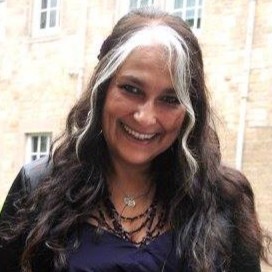 (UK) is a Masters student in Anthrozoology at the University of Exeter. Abolitionist vegan since 1999, her academic background is in Applied Philosophy, Politics, Social Psychology and Sociology, all well-utilised within her current multidisciplinary Anthrozoology programme. Her professional background is varied and includes Further Education lecturing in Sociology, Campaigns Management in animal protection and many years of grassroots abolitionist activism. She has also recently qualified as a Vegan Nutritional Therapist. Lynda’s current research focuses on how society is taught to view animals in different ways so it remains comfortable with their edibility and exploitation. The resulting contradictions between beliefs and
(UK) is a Masters student in Anthrozoology at the University of Exeter. Abolitionist vegan since 1999, her academic background is in Applied Philosophy, Politics, Social Psychology and Sociology, all well-utilised within her current multidisciplinary Anthrozoology programme. Her professional background is varied and includes Further Education lecturing in Sociology, Campaigns Management in animal protection and many years of grassroots abolitionist activism. She has also recently qualified as a Vegan Nutritional Therapist. Lynda’s current research focuses on how society is taught to view animals in different ways so it remains comfortable with their edibility and exploitation. The resulting contradictions between beliefs and
Lucja Lange is Ph.D. student at the Institute of Sociology of the University of Lodz, Poland, and at the Digital Humanities at the Institute of Literary Research of the Polish Academy of Sciences in Warsaw, Poland. MA graduate in Theatre Studies (2004), Ethnology and Culture Anthropology (2015) and the Study of Animal Psychology (2018). In her recent researches, she studies the experience of parents bereavement processes; and the experience of cancer patients’ suffering, along with the phenomenon of cancertainment in digital appearances. Her scientific interests focuses on diversity issues, gender studies, animal studies, and death studies, but not only. She is the author of the book “Anthropologist as an internal auditor” (2016) and co-editor and publisher of e-books “Homelessness in Lodz” (2016), “Flat and home as a cultural and social uncertainty” (2017)
Roberta Langhi (Italy) is a Ph. D. Student in English Literature at the University of Eastern Piedmont, Vercelli. After the completion of a Master’s degree in Languages, Culture and Tourism, Robert’s main issues of research have focused on the intersection between Critical Animal Studies, Queer studies and Gender Studies. The Ph.D. project aims to study the cross-species connection of dogs and the queer community, from a posthumanist and animalist perspective. Roberta is deeply involved in the subject of animal welfare and advocates for total liberation and an ethics of care and respect.
Dr. Daniel Lau 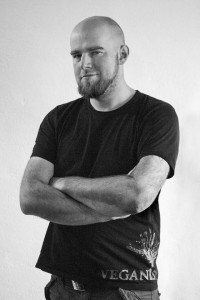 (Germany) My name is Daniel Lau, I work as an archaeologist and I hold a PhD in Mesopotamian Archaeology. I am a lecturer at the Free University of Berlin and at the Universities of Hamburg and Münster. Half of my courses I dedicate to the ancient human-animal interrelationship. Currently I am working on my habilitation thesis on the imaginary human-animal-hybrids in ancient Mesopotamia. I ask how and why these „Mischwesen” were imagined by the ruling elite and how this could help us in understanding the ancient human-animal-bonds. In my work I will follow the CAS cornerstones as far as applicable to archaeological work. I am very interested in animal symbolism and domestication and it’s interconnection with power and bio-politics in order to find out how oppression and mechanisms of othering were already in use in ancient times. I’m am also an activist since 2009 and in 2013 I joined gemany’s largest ALF-support group „die tierbefreier“.
(Germany) My name is Daniel Lau, I work as an archaeologist and I hold a PhD in Mesopotamian Archaeology. I am a lecturer at the Free University of Berlin and at the Universities of Hamburg and Münster. Half of my courses I dedicate to the ancient human-animal interrelationship. Currently I am working on my habilitation thesis on the imaginary human-animal-hybrids in ancient Mesopotamia. I ask how and why these „Mischwesen” were imagined by the ruling elite and how this could help us in understanding the ancient human-animal-bonds. In my work I will follow the CAS cornerstones as far as applicable to archaeological work. I am very interested in animal symbolism and domestication and it’s interconnection with power and bio-politics in order to find out how oppression and mechanisms of othering were already in use in ancient times. I’m am also an activist since 2009 and in 2013 I joined gemany’s largest ALF-support group „die tierbefreier“.
Madelaine Leitsberger (Austria/UK)  Madelaine is a PhD student in animal ethics and welfare at the University of Winchester. My undergraduate studies were in biology and during my Master’s studies in human-animal interactions (Messerli Institute, Veterinary University of Vienna) I dealt with a vast range of welfare issues regarding farm, zoo, laboratory and companion animals. My special areas of interest have been the ‘Disneyisation’ of zoos, as well as the objectification and anthropomorphism of animals in the media. My current research explores synergistic potentials between the utilitarian and the animal rights approach and related animal protection movements, in order to advance animal protection.
Madelaine is a PhD student in animal ethics and welfare at the University of Winchester. My undergraduate studies were in biology and during my Master’s studies in human-animal interactions (Messerli Institute, Veterinary University of Vienna) I dealt with a vast range of welfare issues regarding farm, zoo, laboratory and companion animals. My special areas of interest have been the ‘Disneyisation’ of zoos, as well as the objectification and anthropomorphism of animals in the media. My current research explores synergistic potentials between the utilitarian and the animal rights approach and related animal protection movements, in order to advance animal protection.
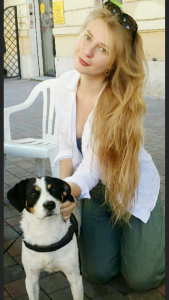 Andreea Maria Lemnaru (France) is a PhD researcher at Paris Sorbonne University IV in Philosophy and Religious Studies. Her background is environmental and political philosophy, metaphysics, philosophy of religions, ancient philosophy and religious studies (history and anthropology of religions).
Andreea Maria Lemnaru (France) is a PhD researcher at Paris Sorbonne University IV in Philosophy and Religious Studies. Her background is environmental and political philosophy, metaphysics, philosophy of religions, ancient philosophy and religious studies (history and anthropology of religions).She is a member of the European Association for the Study of Religions as well as the International Society for Neoplatonic Studies and has been a speaker in Lisbon, Oxford, Montpellier, Krakow and Rome. Besides her research, she has published a poetry book in 2014 at the Editions du Cygne, Paris.
Marie Leth-Espense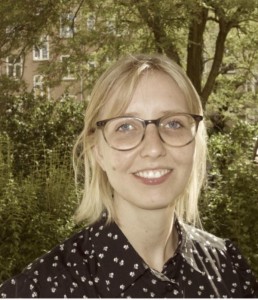 n (Denmark). Marie is a sociologist and doctoral student at the Department of Sociology of Law at Lund University in Sweden. Her research engages with the subject of animal rights, social justice movements and rights discourses. Marie was a part of the organizing team of the 5th European Conference in Critical Animal Studies at Lund University in October 2017. She is a co-founder of the Danish network in Critical Animal Studies that runs a student group with monthly meetings (marie.leth-espensen@soclaw.lu.se).
n (Denmark). Marie is a sociologist and doctoral student at the Department of Sociology of Law at Lund University in Sweden. Her research engages with the subject of animal rights, social justice movements and rights discourses. Marie was a part of the organizing team of the 5th European Conference in Critical Animal Studies at Lund University in October 2017. She is a co-founder of the Danish network in Critical Animal Studies that runs a student group with monthly meetings (marie.leth-espensen@soclaw.lu.se).
Charlotte Lim  is an aspiring CAS research-academic who was first introduced to the discipline in January 2019 as part of a year-long study abroad exchange program at Lund University, Sweden. At the 6th EACAS Conference in Barcelona (2019) she presented her research, titled “Light as a Feather? The Weight of Structural Violence in the Down Feather Industry” examining ‘welfarism’ (Canavan, 2017) in the fashion industry. Charlotte holds a Bachelor’s degree in Gender Studies from University of Sydney, Australia. Her main interests include the intersections of gendered, animal and ecological violence; ‘naturecultures’ (Haraway, 2003), race, queerness and asexualities.
is an aspiring CAS research-academic who was first introduced to the discipline in January 2019 as part of a year-long study abroad exchange program at Lund University, Sweden. At the 6th EACAS Conference in Barcelona (2019) she presented her research, titled “Light as a Feather? The Weight of Structural Violence in the Down Feather Industry” examining ‘welfarism’ (Canavan, 2017) in the fashion industry. Charlotte holds a Bachelor’s degree in Gender Studies from University of Sydney, Australia. Her main interests include the intersections of gendered, animal and ecological violence; ‘naturecultures’ (Haraway, 2003), race, queerness and asexualities.
 EvaMarie Lindahl, PhD (Sweden), is a visual artist and researcher based in Sweden. Her research-driven art projects are situated in the intersection of critical animal studies and visual arts. She creates large-scale graphite drawings and text-based performance work that aims to challenge anthropocentric and patriarchal perspectives in art history by rewriting and imagining new (art)histories. Her current work addresses the human-animal dichotomy and oppression of non-human animals in art production. In 2022, she obtained her doctoral degree from Edge Hill University (UK) with a practice-based thesis titled Resistance Within the Museum Fauna – Challenging Anthropocentrism through Counter Art Histories and Non-Human Narratives that is engaged in decentring the human in art history in favour of non-human animals. Website: www.evamarielindahl.com.
EvaMarie Lindahl, PhD (Sweden), is a visual artist and researcher based in Sweden. Her research-driven art projects are situated in the intersection of critical animal studies and visual arts. She creates large-scale graphite drawings and text-based performance work that aims to challenge anthropocentric and patriarchal perspectives in art history by rewriting and imagining new (art)histories. Her current work addresses the human-animal dichotomy and oppression of non-human animals in art production. In 2022, she obtained her doctoral degree from Edge Hill University (UK) with a practice-based thesis titled Resistance Within the Museum Fauna – Challenging Anthropocentrism through Counter Art Histories and Non-Human Narratives that is engaged in decentring the human in art history in favour of non-human animals. Website: www.evamarielindahl.com.
Tobias Linné (Sweden) 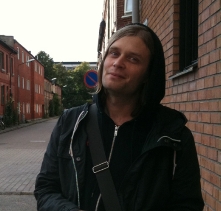 holds a Ph.D. in sociology and is assistant professor at the Department of Communication and Media at Lund University, Sweden. Tobias’ research concerns veganism and non-human animals as food, exploring how other animals are made accessible for human consumption. His current project deals with the framing of non-human animals in dairy industry commercials. In 2012 he co-developed (with Helena Pedersen) the course Critical Animal Studies: Animals in Society, Culture and the Media at Lund University.
holds a Ph.D. in sociology and is assistant professor at the Department of Communication and Media at Lund University, Sweden. Tobias’ research concerns veganism and non-human animals as food, exploring how other animals are made accessible for human consumption. His current project deals with the framing of non-human animals in dairy industry commercials. In 2012 he co-developed (with Helena Pedersen) the course Critical Animal Studies: Animals in Society, Culture and the Media at Lund University.
Lotta Luhtala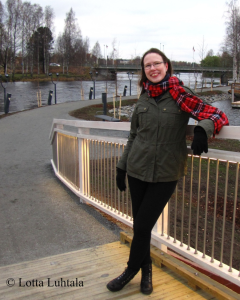 (Finland) M.A., is a Ph.D. candidate at the University of Turku. In her Ph.D. dissertation “The Theory and Method of Vegan Readership. Intersectional Connections in Vegan Fiction” she analyses how veganism, non-human animals, gender and the environment are intertwined with each other in vegan literature. Her main disciplines are Literary Studies (Narrative theory, Feminist literary criticism, and Ecocriticism), Vegan Studies, Critical Animal Studies, Ecofeminism. Her areas of interest are veganism, nonhuman animals, animal ethics, narrative fiction, intersectionality, and feminism.
(Finland) M.A., is a Ph.D. candidate at the University of Turku. In her Ph.D. dissertation “The Theory and Method of Vegan Readership. Intersectional Connections in Vegan Fiction” she analyses how veganism, non-human animals, gender and the environment are intertwined with each other in vegan literature. Her main disciplines are Literary Studies (Narrative theory, Feminist literary criticism, and Ecocriticism), Vegan Studies, Critical Animal Studies, Ecofeminism. Her areas of interest are veganism, nonhuman animals, animal ethics, narrative fiction, intersectionality, and feminism.
Jeff Mannes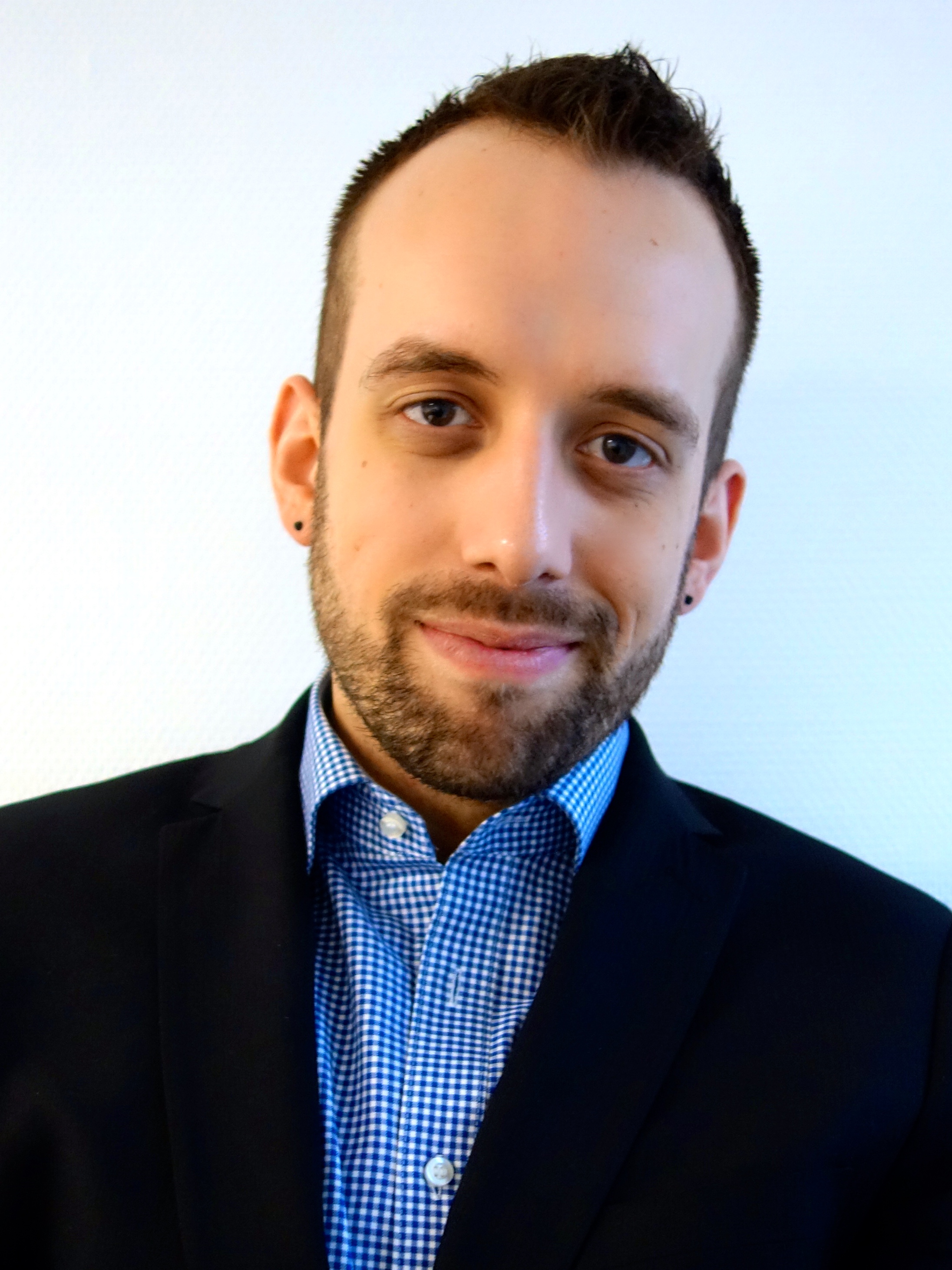 (Germany) Jeff Mannes studies sociology, politics and gender at the university in Trier (Germany) and focuses on human-animal relationships, sexuality and the dynamics of social justice. He is currently writing his bachelor thesis on carnism and the mechanics of dichotomization, deindividualization and objectification of farmed animals in media. Jeff Mannes also works as Communications Coordinator for Beyond Carnism, an international organization (founded by social psychologist Dr. Melanie Joy) whose mission is to raise awareness of and transform carnism, the invisible belief system that conditions people to eat certain animals. He gives talks on carnism internationally. Jeff Mannes’ main interests include: the psychology of eating animals, gender and meat, intersectionality, the consequences of the human-animal relationship on human sexuality, and the dynamics of socialization and reinforcement of existing inequalities.
(Germany) Jeff Mannes studies sociology, politics and gender at the university in Trier (Germany) and focuses on human-animal relationships, sexuality and the dynamics of social justice. He is currently writing his bachelor thesis on carnism and the mechanics of dichotomization, deindividualization and objectification of farmed animals in media. Jeff Mannes also works as Communications Coordinator for Beyond Carnism, an international organization (founded by social psychologist Dr. Melanie Joy) whose mission is to raise awareness of and transform carnism, the invisible belief system that conditions people to eat certain animals. He gives talks on carnism internationally. Jeff Mannes’ main interests include: the psychology of eating animals, gender and meat, intersectionality, the consequences of the human-animal relationship on human sexuality, and the dynamics of socialization and reinforcement of existing inequalities.
Prof. Dr. Dario Martinelli  is Director of the International Semiotics Institute, Professor at Kaunas University of Technology, and adjunct professor at the universities of Helsinki and of Lapland. He is member of various scientific and editorial boards, and has served as Visiting Professor in four different European academic institutions. Among his recent monographs in animal studies: Lights, Camera, Bark! (Technologija, 2014), A Critical Companion to Zoosemiotics (Springer, 2010), Of Birds, Whales and Other Musicians (University of Scranton Press, 2009), and a “popular philosophy” work entitled Lettera a un futuro animalista (Mursia, 2014). In 2006, he was knighted by the Italian Republic for his contribution to Italian culture abroad.
is Director of the International Semiotics Institute, Professor at Kaunas University of Technology, and adjunct professor at the universities of Helsinki and of Lapland. He is member of various scientific and editorial boards, and has served as Visiting Professor in four different European academic institutions. Among his recent monographs in animal studies: Lights, Camera, Bark! (Technologija, 2014), A Critical Companion to Zoosemiotics (Springer, 2010), Of Birds, Whales and Other Musicians (University of Scranton Press, 2009), and a “popular philosophy” work entitled Lettera a un futuro animalista (Mursia, 2014). In 2006, he was knighted by the Italian Republic for his contribution to Italian culture abroad.
Abi Masefield (UK)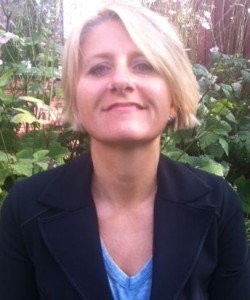 25 years ago Abi started working on issues relating to global food security at the same time as becoming a vegan. Abi has lived in many different countries over the years and raised my three children as passionate ethical vegans. Abi has experience of working with a range of donors, UN agencies, NGOs and academic institutions and am currently an independent consultant on the political economy of nutrition. Abi is also engaged in PhD research, at the Centre for Human-Animal Studies (CfHAS) at Edge Hill University, to better understand the apparent discursive blind spot regarding the centrality of non-human animal consumption for the realization of everyone’s basic rights.
25 years ago Abi started working on issues relating to global food security at the same time as becoming a vegan. Abi has lived in many different countries over the years and raised my three children as passionate ethical vegans. Abi has experience of working with a range of donors, UN agencies, NGOs and academic institutions and am currently an independent consultant on the political economy of nutrition. Abi is also engaged in PhD research, at the Centre for Human-Animal Studies (CfHAS) at Edge Hill University, to better understand the apparent discursive blind spot regarding the centrality of non-human animal consumption for the realization of everyone’s basic rights.
Dr. Seán McCorry (UK) Seán McCorry is a postdoctoral researcher in English Literature based at the University of Sheffield. He has recently completed his PhD, which addressed humanism and its nonhuman others (principally animals and technology) in postwar culture. He is currently working on turning his PhD thesis into a research monograph, provisionally entitled Animal/Machine: Technology, Subjectivity, and Species in Postwar Culture, 1945-1970. He is also the co-ordinator of the Sheffield Animals Research Colloquium. His research interests include vegan theory, posthumanism, Cold War culture, and science fiction.
Sheffield. He has recently completed his PhD, which addressed humanism and its nonhuman others (principally animals and technology) in postwar culture. He is currently working on turning his PhD thesis into a research monograph, provisionally entitled Animal/Machine: Technology, Subjectivity, and Species in Postwar Culture, 1945-1970. He is also the co-ordinator of the Sheffield Animals Research Colloquium. His research interests include vegan theory, posthumanism, Cold War culture, and science fiction.
Gordon Meade is a Scottish poet based in the East Neuk of Fife. In the past, he has been the Creative Writing Fellow at the Duncan of Jordanstone College of Art, and the Royal Literary Fund Writing Fellow at the University of Dundee. He has read from his work throughout the United Kingdom, Belgium, Germany, Ireland, and Luxembourg. He has published ten collections of poems, including Les Animots : A Human Bestiary (Cultured Llama 2015) and Zoospeak (Enthusiastic Press 2020). At present, he is working on his next collection, EX-posed, another collaboration with the Canadian photographer and animal activist, Jo-Anne McArthur.
a Scottish poet based in the East Neuk of Fife. In the past, he has been the Creative Writing Fellow at the Duncan of Jordanstone College of Art, and the Royal Literary Fund Writing Fellow at the University of Dundee. He has read from his work throughout the United Kingdom, Belgium, Germany, Ireland, and Luxembourg. He has published ten collections of poems, including Les Animots : A Human Bestiary (Cultured Llama 2015) and Zoospeak (Enthusiastic Press 2020). At present, he is working on his next collection, EX-posed, another collaboration with the Canadian photographer and animal activist, Jo-Anne McArthur.
Eva Meijer (Netherlands) 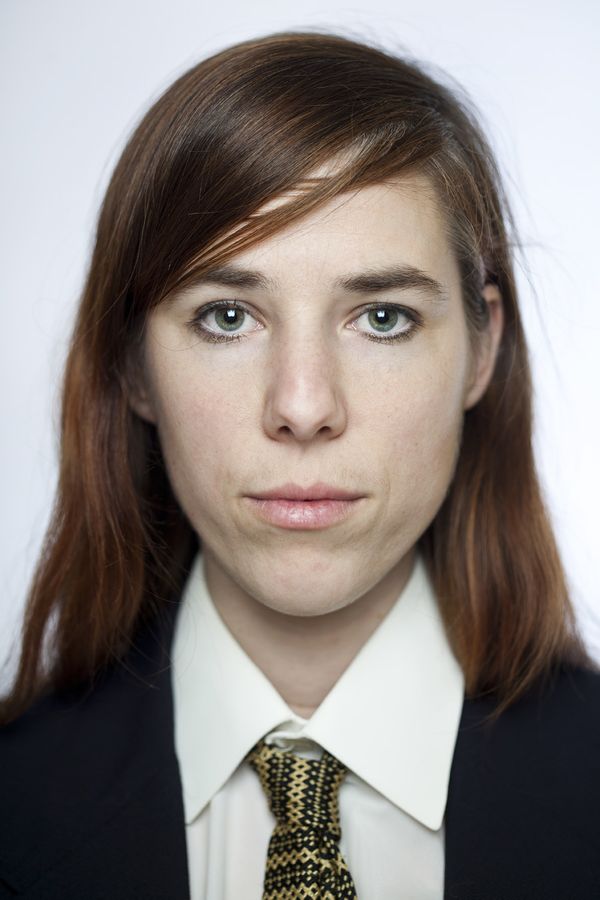 is currently working on a PhD project in philosophy at the University of Amsterdam, titled ‘Political Animal Voices’, in which she develops a theory of political animal voice. She teaches the course ‘Animal Ethics and Politics’ at the University of Amsterdam and is the chair of the Dutch study group for animal ethics. Recent publications include ‘Political communication with animals’ in Humanimalia: A Journal of Human-Animal Interface Studies, and ‘Stray Philosophy: Dog-Human Observations on Language, Freedom and Politics’ in Journal for Critical Animal Studies. In addition to her academic work, Meijer works as a novelist, visual artist and singer-songwriter.
is currently working on a PhD project in philosophy at the University of Amsterdam, titled ‘Political Animal Voices’, in which she develops a theory of political animal voice. She teaches the course ‘Animal Ethics and Politics’ at the University of Amsterdam and is the chair of the Dutch study group for animal ethics. Recent publications include ‘Political communication with animals’ in Humanimalia: A Journal of Human-Animal Interface Studies, and ‘Stray Philosophy: Dog-Human Observations on Language, Freedom and Politics’ in Journal for Critical Animal Studies. In addition to her academic work, Meijer works as a novelist, visual artist and singer-songwriter.
Christopher Jain Miller 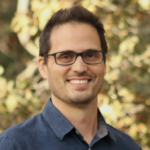 received his PhD in the Study of Religion from the University of California at Davis. He is the VP of Academic Affairs at Arihanta Institute and a Visiting Researcher at the University of Zurich’s Asien-Orient-Institut. His book, Embodying Transnational Yoga, is under contract with Routledge’s Indian Ocean / Trans Asia book series.
received his PhD in the Study of Religion from the University of California at Davis. He is the VP of Academic Affairs at Arihanta Institute and a Visiting Researcher at the University of Zurich’s Asien-Orient-Institut. His book, Embodying Transnational Yoga, is under contract with Routledge’s Indian Ocean / Trans Asia book series.
Katarzyna Nowak-McNeice is  Adjunct Professor of American Literature and Culture at the University of Wrocław, Poland. She is the author of California and the Melancholic American Identity in Joan Didion’s Novels: Exiled from Eden and Melancholic Travelers: Autonomy, Hybridity and the Maternal. She co-edited Representations and Images of Frontiers and Borders: On the Edge, A Dark California: Essays on Dystopian Depictions in Popular Culture, and Interiors: Interiority/Exteriority in Literary and Cultural Discourse. Her scholarly interests include critical posthumanities and global literatures in English. As Kate Novak she publishes short stories (in Tulsa Review, Fairlight Books, and others); as McNovak she has co-authored several short movies.
Adjunct Professor of American Literature and Culture at the University of Wrocław, Poland. She is the author of California and the Melancholic American Identity in Joan Didion’s Novels: Exiled from Eden and Melancholic Travelers: Autonomy, Hybridity and the Maternal. She co-edited Representations and Images of Frontiers and Borders: On the Edge, A Dark California: Essays on Dystopian Depictions in Popular Culture, and Interiors: Interiority/Exteriority in Literary and Cultural Discourse. Her scholarly interests include critical posthumanities and global literatures in English. As Kate Novak she publishes short stories (in Tulsa Review, Fairlight Books, and others); as McNovak she has co-authored several short movies.
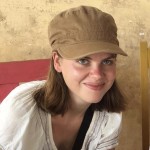 Camilla Olesen (Denmark) Camilla has a master’s degree in Literature, Culture and Media from Lund University in Sweden. She is in summer 2018 done with her research within the fields of CAS, comparative literature and childhood studies. She is a co-manager of the Danish network in CAS and works for an NGO that deals with sustainable development in projects that aim at increased quality education, food security and gender equality in Ghana and Kenya. She is also an educator for the Danish United Nation Association. Her research at Lund engages with the subject of species relations between human children and other animals in anthroparchy. It problematizes ideals of growth according to how adult humans write about animals in educational material in biology for children and how it intersects with the ways they teach children about proper ways of living with other animals in children’s literature.
Camilla Olesen (Denmark) Camilla has a master’s degree in Literature, Culture and Media from Lund University in Sweden. She is in summer 2018 done with her research within the fields of CAS, comparative literature and childhood studies. She is a co-manager of the Danish network in CAS and works for an NGO that deals with sustainable development in projects that aim at increased quality education, food security and gender equality in Ghana and Kenya. She is also an educator for the Danish United Nation Association. Her research at Lund engages with the subject of species relations between human children and other animals in anthroparchy. It problematizes ideals of growth according to how adult humans write about animals in educational material in biology for children and how it intersects with the ways they teach children about proper ways of living with other animals in children’s literature.
Professor Claire Parkinson (UK) PhD, is Professor of Film, Television and Digital Media and Co-Director of the Centre for Human Animal Studies at Edge Hill University in Lancashire, UK. Her publications include the books Beyond Human: From animality to transhumanism (Continuum, 2012); Popular Media and Animals (Palgrave, 2011) and Animals, Anthropomorphism and Mediated Encounters (Routledge, 2019). She was founding Director of the Institute for Creative Enterprise and the Centre for Human Animal Studies at Edge Hill University. Claire is currently Principal Investigator for the UKRI AHRC funded Multispecies Storytelling network and the ‘Multisensory multispecies storytelling to engage disadvantaged groups in changing landscapes’ projects.
Dr. Helena Pedersen (Sweden) Helena Pedersen is Associate Professor in Education at the Department of Child and Youth Studies, Stockholm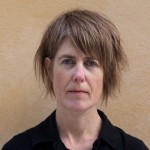 University. Her primary research interests include critical animal studies, critical theory, educational philosophy and posthumanism. She is author of Animals in Schools: Processes and Strategies in Human-Animal Education (Purdue University Press, 2010), which received the Critical Animal Studies Book of the Year Award in 2010. The course Critical Animal Studies: Animals in Society, Culture and the Media, co-developed and taught with Tobias Linné at Lund University, received the “Distinguished New Animals and Society Course Award” by the Humane Society of the United States in 2012. In 2015, she also organized and co-taught the PhD course Gender and Critical Animal Studies at Stockholm University. Helena has published in journals such as Emotion, Space and Society; International Journal of Qualitative Studies in Education; Studies in Philosophy and Education; Culture, Theory and Critique; Policy Futures in Education; and Culture and Organization. Helena is Co-editor of the Critical Animal Studies book series (Brill) and serves on the editorial board of Other Education: The Journal of Educational Alternatives. Together with Tobias Linné and Amelie Björck she coordinated the research theme “Exploring ‘the Animal Turn’: Changing perspectives on human-animal relations in science, society and culture”, funded by the Pufendorf Institute for Advanced Studies at Lund University 2013-14. For more information, see http://su.avedas.com/converis/person/5629
University. Her primary research interests include critical animal studies, critical theory, educational philosophy and posthumanism. She is author of Animals in Schools: Processes and Strategies in Human-Animal Education (Purdue University Press, 2010), which received the Critical Animal Studies Book of the Year Award in 2010. The course Critical Animal Studies: Animals in Society, Culture and the Media, co-developed and taught with Tobias Linné at Lund University, received the “Distinguished New Animals and Society Course Award” by the Humane Society of the United States in 2012. In 2015, she also organized and co-taught the PhD course Gender and Critical Animal Studies at Stockholm University. Helena has published in journals such as Emotion, Space and Society; International Journal of Qualitative Studies in Education; Studies in Philosophy and Education; Culture, Theory and Critique; Policy Futures in Education; and Culture and Organization. Helena is Co-editor of the Critical Animal Studies book series (Brill) and serves on the editorial board of Other Education: The Journal of Educational Alternatives. Together with Tobias Linné and Amelie Björck she coordinated the research theme “Exploring ‘the Animal Turn’: Changing perspectives on human-animal relations in science, society and culture”, funded by the Pufendorf Institute for Advanced Studies at Lund University 2013-14. For more information, see http://su.avedas.com/converis/person/5629
Pauliina Rautio (Finland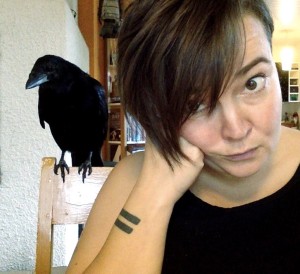 ) is a Research Fellow at the Faculty of Education at University of Oulu in Finland and also an Adjunct Professor of Education at University of Helsinki. She is currently the principal investigator of a research project on child-animal relations (AniMate), funded by Emil Aaltonen foundation (2017-2019). Pauliina is the editor of a forthcoming international ChildhoodNatures research handbook section on Child-Animal Relations, to be published by Springer in 2018. Her research interests lie in addressing and deconstructing the deep-rooted speciesism and anthropocentric humanism in theories and practices of education. In doing this she studies everyday life human-animal relations as multi-species ontologies, and conceptualised beyond species constructs. Pauliina also takes care of injured wild birds in her spare time (see Instagram @pihalintu).
) is a Research Fellow at the Faculty of Education at University of Oulu in Finland and also an Adjunct Professor of Education at University of Helsinki. She is currently the principal investigator of a research project on child-animal relations (AniMate), funded by Emil Aaltonen foundation (2017-2019). Pauliina is the editor of a forthcoming international ChildhoodNatures research handbook section on Child-Animal Relations, to be published by Springer in 2018. Her research interests lie in addressing and deconstructing the deep-rooted speciesism and anthropocentric humanism in theories and practices of education. In doing this she studies everyday life human-animal relations as multi-species ontologies, and conceptualised beyond species constructs. Pauliina also takes care of injured wild birds in her spare time (see Instagram @pihalintu).
Dr. Kurt Remele (Austria) Kurt Remele, Dr theol, is an associate professor of Ethics and Catholic Social Thought at Karl-Franzens-University in Graz, Austria, where he has taught since 1992. He was a lecturer at Ruhr-University Bochum in Germany (1984-90), a Fulbright Scholar at The Catholic University of America in Washington, D.C. (2003), a Visiting Professor at the University of Minnesota (2007) and at Gonzaga University, Spokane, USA (academic year 2011/12). He has voiced his concern for animals in academic journals, newspaper articles and lectures, on the radio and on TV. He is a Fellow of the Oxford Centre for Animal Ethics. Forthcoming in March 2016: Die Würde des Tieres ist unantastbar. Eine neue christliche Tierethik, Kevelaer: Butzon & Bercker. E-mail: kurt.remele@uni-graz.at.
Dr.  Cordeiro Rodrigues is currently a research fellow at the Department of Philosophy (Zhuhai), Sun Yat-sen University. He works on the relationship between multiculturalism and animals as well as the morality of terrorism. He has published an edited book with Routledge and articles in various journals such as Theoria, Journal for Crititcal Animal Studies, Social Movements Studies and Critical Studies on Terrorism.
Cordeiro Rodrigues is currently a research fellow at the Department of Philosophy (Zhuhai), Sun Yat-sen University. He works on the relationship between multiculturalism and animals as well as the morality of terrorism. He has published an edited book with Routledge and articles in various journals such as Theoria, Journal for Crititcal Animal Studies, Social Movements Studies and Critical Studies on Terrorism.
 María Ruiz Carreras (Spain) is a communicator with Spanish-Colombian origins, holding a PhD in Communication from Pompeu Fabra University with a CAS thesis about the discoursive strategies of the European dairy industry, a Master’s in Communication and Socio-Cultural Issues, and a Master’s in Translation. She previously graduated in Advertising and Public Relations, and before that, in Graphic Design.
María Ruiz Carreras (Spain) is a communicator with Spanish-Colombian origins, holding a PhD in Communication from Pompeu Fabra University with a CAS thesis about the discoursive strategies of the European dairy industry, a Master’s in Communication and Socio-Cultural Issues, and a Master’s in Translation. She previously graduated in Advertising and Public Relations, and before that, in Graphic Design.
María is a communications specialist with 20 years of experience in roles ranging from journalism and hands-on communication materials production to strategy and advisory work for European organisations. For the last few years, María has been working as a lecturer and researcher at the Strategic Communication Department and the Media and Communication at Lund University (Sweden). She is a Lund University Critical Animal Studies Network (LUCASN) member. Her research examines different issues related to strategic communication, political economy, critical animal studies, public relations and public affairs, and she is also interested in intersectionality, the environment and sustainability from a Critical Animal Studies and Critical Media Studies perspective.
María has been a teacher of the Critical Animal Studies: Animals in Society, Culture and the Media course at Lund University for some years. She hosts the podcast ECA Podcast about #CriticalAnimalStudies with interviews with scholars and activists granted by the Culture and Animals Foundation. As part of her activism, she worked in the translating teams to translate the books “The sexual politics of Meat” (Carol J. Adams) and “Interspecies Ethics” (Cynthia Willett) into Spanish. (LINK)
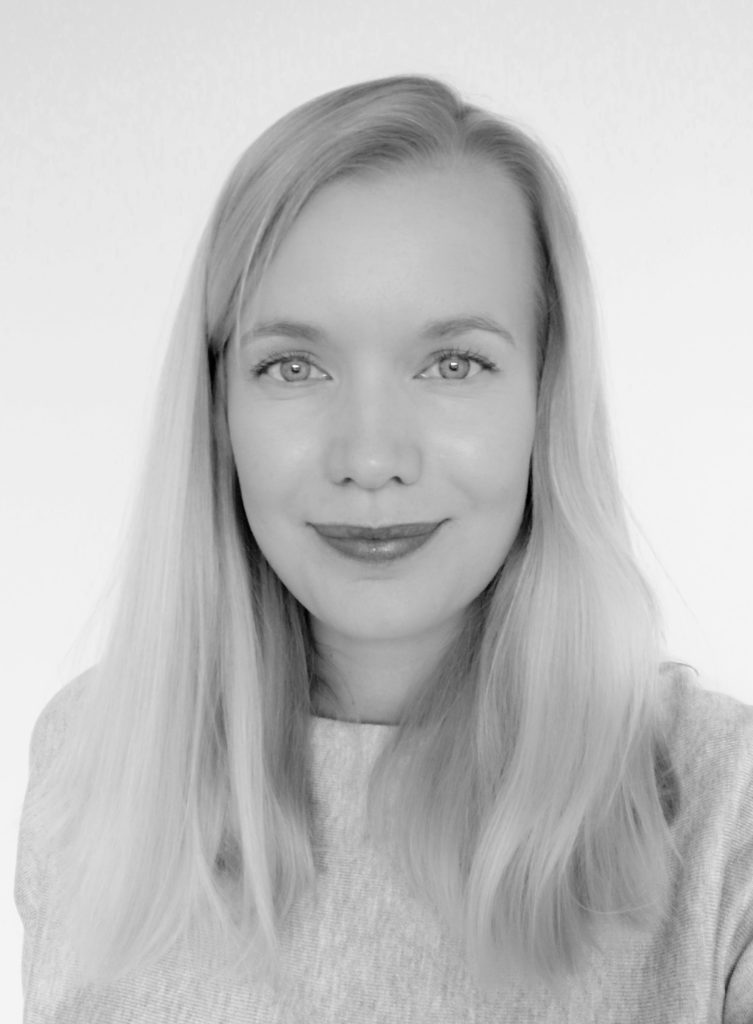 Maria Helena Saari (Finland). PhD Candidate at University of Oulu and graduate of the Master in Animal Law & Society from Universitat Autonoma de Barcelona. Her research is focused on animals in educational contexts, the shortcomings of dominant anthropocentric pedagogies and the transformative opportunities offered by alternative frameworks, such as humane education. Maria’s main research interests include: humane education, ecojustice, environmental education, animal law, educational policy and curriculum analysis, and critical animal studies. Maria also teaches environmental education and childhood studies courses.
Maria Helena Saari (Finland). PhD Candidate at University of Oulu and graduate of the Master in Animal Law & Society from Universitat Autonoma de Barcelona. Her research is focused on animals in educational contexts, the shortcomings of dominant anthropocentric pedagogies and the transformative opportunities offered by alternative frameworks, such as humane education. Maria’s main research interests include: humane education, ecojustice, environmental education, animal law, educational policy and curriculum analysis, and critical animal studies. Maria also teaches environmental education and childhood studies courses.
Miriam Schmidt-Jüngst is a German linguist currently working at the Department for German Linguistics at the Johannes Gutenberg-University of Mainz, Germany. Their research is concerned with social and particularly communicative practices in the encounter of human and nonhuman animals as well as between human and nonhuman animals and machines. Their broader interest centres around understanding human categorisation of themselves and their surroundings and the classification systems invented for this purpose. Incorporating their previous work at the intersection of queer and trans studies and linguistics, Miriam Schmidt-Jüngst’s research is concerned with normative conceptualisations of being, othering and the positionality of ‚deviant‘ subjectivities.
Eva Spiegelhofer (AT) 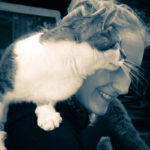 holds a Joint Masters degree in cultural studies after completing an Erasmus Mundus Masters programme at universities in Germany (Universität Tübingen), the UK (University of Sheffield) and Poland (Adam Mickiewicz University). As an undergraduate she became interested in literary animal studies, soon turning towards broader questions within critical animal studies and multispecies studies. For her dissertation project, she specialised in animal languages and interspecies communication, conducting field research on farmed animals and investigating the potential of dialogue between humans and other animals from a socio-cultural perspective. She is currently preparing to continue her research on interspecies communication at PhD level. Aside from her academic interests, Eva seeks to actively engage with other animals by volunteering at local animal shelters and sanctuaries.
holds a Joint Masters degree in cultural studies after completing an Erasmus Mundus Masters programme at universities in Germany (Universität Tübingen), the UK (University of Sheffield) and Poland (Adam Mickiewicz University). As an undergraduate she became interested in literary animal studies, soon turning towards broader questions within critical animal studies and multispecies studies. For her dissertation project, she specialised in animal languages and interspecies communication, conducting field research on farmed animals and investigating the potential of dialogue between humans and other animals from a socio-cultural perspective. She is currently preparing to continue her research on interspecies communication at PhD level. Aside from her academic interests, Eva seeks to actively engage with other animals by volunteering at local animal shelters and sanctuaries.
Dr. Vasile Stanescu Vasile Stanescu holds a Ph.D. from Stanford University; he serves as Assistant Professor of Communication at Mercer University. Stanescu co-edits the Critical Animal Studies book series published by Brill/Rodopi. He has presented his research on the connections (and tensions) between animal rights and environmentalism at Stanford, Harvard, Berkeley, and Yale, and, internationally, at universities throughout Canada, Australia, The United Kingdom, Germany, Romania, Turkey, Poland and the Netherlands. Stanescu‘s research has been recognized The Woods Institute for the Environment, Minding Animals International, The Andrew Mellon Foundation, and the Culture and Animals Foundation, among others. Stanescu has authored twelve peer reviewed publications; he is currently working on a book project entitled: Happy Meals: Animals, Nature, and the Myth of Consent.
Eline D. Tabak (UK)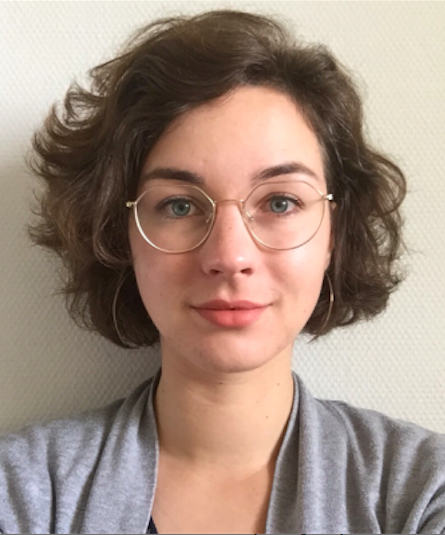 is PhD Candidate at the Universities of Bristol & Bath Spa. She has a background in comparative literary studies (Utrecht/Amsterdam) and now works in the field of environmental humanities, combining ecocriticism, environmental history, ecological entomology and related fields. She studies creative and scientific narratives of insect declines, paying particular attention to how these storytelling practices reflect upon questions of care and (in)attention regarding wildlife extinction. Before moving to the UK, she was a Cultuurfonds Fellow at the Rachel Carson Center in Munich, Germany.
is PhD Candidate at the Universities of Bristol & Bath Spa. She has a background in comparative literary studies (Utrecht/Amsterdam) and now works in the field of environmental humanities, combining ecocriticism, environmental history, ecological entomology and related fields. She studies creative and scientific narratives of insect declines, paying particular attention to how these storytelling practices reflect upon questions of care and (in)attention regarding wildlife extinction. Before moving to the UK, she was a Cultuurfonds Fellow at the Rachel Carson Center in Munich, Germany.
Dr. Agnes Trzak (UK) 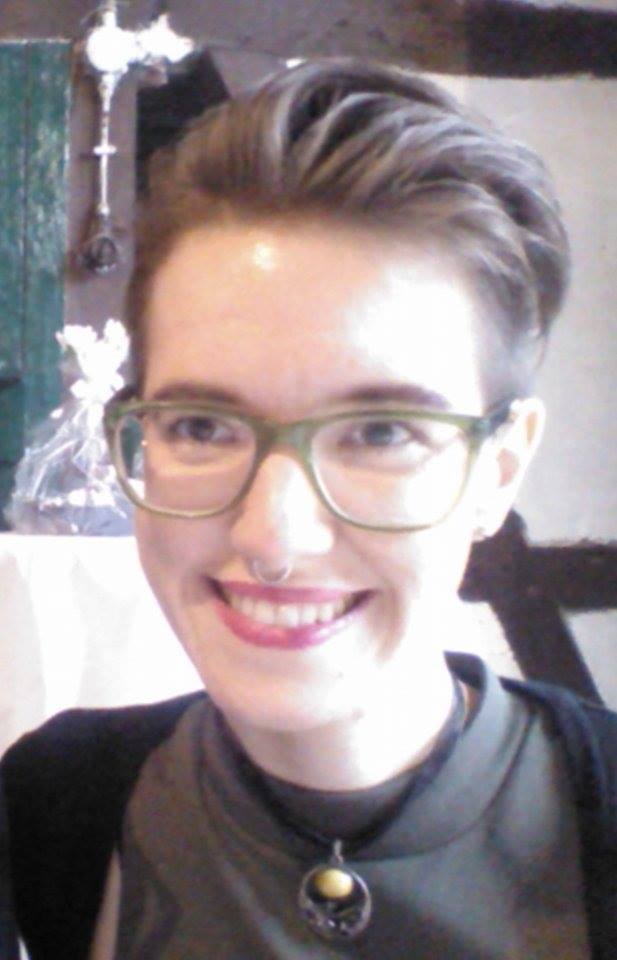 combines critical animal studies, feminism and the ahuman in her research. She focusses on exploring ways of undoing anthropocentric and masculine power structures. Being particularly interested in Patricia MacCormack’s conceptualisation of the ahuman she explores ways of implementing philosophy into activism. As an activist she strives to put her theory into practice and mainly organises with the Anti-Speciesist Collective, tackling interconnected oppression and participating in a wide range of anarchist causes, for example in the form of outreach, direct action and prisoner support.
combines critical animal studies, feminism and the ahuman in her research. She focusses on exploring ways of undoing anthropocentric and masculine power structures. Being particularly interested in Patricia MacCormack’s conceptualisation of the ahuman she explores ways of implementing philosophy into activism. As an activist she strives to put her theory into practice and mainly organises with the Anti-Speciesist Collective, tackling interconnected oppression and participating in a wide range of anarchist causes, for example in the form of outreach, direct action and prisoner support.
Dr. Salla Tuomivaara (Finland) 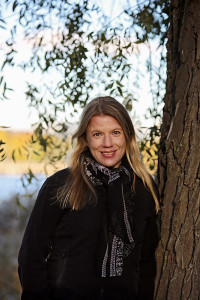 Salla Tuomivaara is a sociologist (PhD), who works as the coordinator for Network for Critical Animal Studies in Finland. She recently defended her PhD dissertation ”Searching for the roots of exclusion: animals in the sociologies of Westermarck and Durkheim”, which explores the forms in which animal and animals appear in the texts of the classical era of sociology and the sociological themes that bring animals into them. The dissertation searches for the significance of the human–animal boundary in sociological theory construction from a historical perspective. Tuomivaara’s main research interests are animal–human dualism, significance of the human-animal boundary and history of social sciences. Tuomivaara is also a long-term animal advocate and NGO professional. Currently she writes a book on animal issues.
Salla Tuomivaara is a sociologist (PhD), who works as the coordinator for Network for Critical Animal Studies in Finland. She recently defended her PhD dissertation ”Searching for the roots of exclusion: animals in the sociologies of Westermarck and Durkheim”, which explores the forms in which animal and animals appear in the texts of the classical era of sociology and the sociological themes that bring animals into them. The dissertation searches for the significance of the human–animal boundary in sociological theory construction from a historical perspective. Tuomivaara’s main research interests are animal–human dualism, significance of the human-animal boundary and history of social sciences. Tuomivaara is also a long-term animal advocate and NGO professional. Currently she writes a book on animal issues.
Dr. Richard Twine (UK) 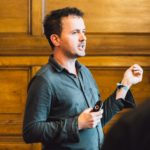 Richard Twine works at the intersection of critical animal studies, environmental sociology, gender studies and science and technology studies. He is Senior Lecturer in Social Sciences at Edge Hill University, UK as well as Co-Director of the Centre for Human/Animal Studies (CfHAS). His PhD, completed in 2002, brought together the ecofeminist critique of dualism with that found in much recent sociological writings in order to further probe the basis for intersectionality. He is the author of the book Animals as Biotechnology – Ethics, Sustainability and Critical Animal Studies (Routledge 2010), as well as several articles and book chapters on science studies, posthumanism, ecofeminism, veganism, bioethics, and critical animal studies. He is also co-editor with Nik Taylor (Flinders University, Australia) of The Rise of Critical Animal Studies – From the Margins to the Centre (Routledge, 2014). Between 2002 and 2012 he held research positions at Lancaster University (specifically the ESRC Centre for Economic and Social Aspects of Genomics). He has also worked at the Institute of Education in London and the University of Glasgow. His current research primarily centres on the relationships between climate change, food practices and human/animal relations.
Richard Twine works at the intersection of critical animal studies, environmental sociology, gender studies and science and technology studies. He is Senior Lecturer in Social Sciences at Edge Hill University, UK as well as Co-Director of the Centre for Human/Animal Studies (CfHAS). His PhD, completed in 2002, brought together the ecofeminist critique of dualism with that found in much recent sociological writings in order to further probe the basis for intersectionality. He is the author of the book Animals as Biotechnology – Ethics, Sustainability and Critical Animal Studies (Routledge 2010), as well as several articles and book chapters on science studies, posthumanism, ecofeminism, veganism, bioethics, and critical animal studies. He is also co-editor with Nik Taylor (Flinders University, Australia) of The Rise of Critical Animal Studies – From the Margins to the Centre (Routledge, 2014). Between 2002 and 2012 he held research positions at Lancaster University (specifically the ESRC Centre for Economic and Social Aspects of Genomics). He has also worked at the Institute of Education in London and the University of Glasgow. His current research primarily centres on the relationships between climate change, food practices and human/animal relations.
Dr. Jessica Ullrich 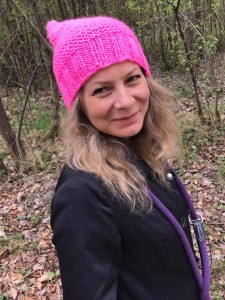 (Germany) studied art history, fine arts and literature in Frankfurt as well as Arts Administration in Berlin. She has been assistant professor for art history at the University of Arts in Berlin and for Human-Animal Studies at the University Nuremberg-Erlangen. Currently she is guest professor at the Academy of Fine Arts Münster. She also works as a curator and published exhibition catalogues and collection of essays on animals in art. Her research interest lies in the ethics and aesthetics of human-animal relationships in art. She is the editor of Tierstudien, a German academic journal for animal studies.
(Germany) studied art history, fine arts and literature in Frankfurt as well as Arts Administration in Berlin. She has been assistant professor for art history at the University of Arts in Berlin and for Human-Animal Studies at the University Nuremberg-Erlangen. Currently she is guest professor at the Academy of Fine Arts Münster. She also works as a curator and published exhibition catalogues and collection of essays on animals in art. Her research interest lies in the ethics and aesthetics of human-animal relationships in art. She is the editor of Tierstudien, a German academic journal for animal studies.
Dr. Tereza Vandrovcová (Czech Republic) 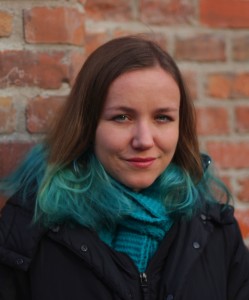 is an academic (teacher and course guarantor) at the University of New York in Prague (UNYP) where she teaches Social Psychology, Intro to Sociology and Animals in Human Society: Psychological Perspectives. She also teaches introduction to Animal Studies at the Charles University (Prague) and Masaryk University (Brno). Her research interests include critical animal studies, psychology of meat consumption and sociology of science. In 2011 she published a book called “Animal as an Experimental Object: a Sociological Reflection” (in Czech) and she co-organized the second European Critical Animal Studies Conference in Prague. In 2012 she became the Institute for Critical Animal Studies ‘Tyke Scholar of Year’ and between 2013 and 2015 she was a Regional Director of the Institute for Critical Animal Studies, Europe. In 2015 she co-found EACAS and Czech Vegan Society (Česká veganská společnost). In 2017 she finished her Ph.D. in Sociology from the Faculty of Arts, Charles University (Prague, Czech Republic) with thesis called “Animals as Laboratory Objects: Analysis of the Power Discourse.” (in Czech). Email: Tereza@Vandrovcova.cz.
is an academic (teacher and course guarantor) at the University of New York in Prague (UNYP) where she teaches Social Psychology, Intro to Sociology and Animals in Human Society: Psychological Perspectives. She also teaches introduction to Animal Studies at the Charles University (Prague) and Masaryk University (Brno). Her research interests include critical animal studies, psychology of meat consumption and sociology of science. In 2011 she published a book called “Animal as an Experimental Object: a Sociological Reflection” (in Czech) and she co-organized the second European Critical Animal Studies Conference in Prague. In 2012 she became the Institute for Critical Animal Studies ‘Tyke Scholar of Year’ and between 2013 and 2015 she was a Regional Director of the Institute for Critical Animal Studies, Europe. In 2015 she co-found EACAS and Czech Vegan Society (Česká veganská společnost). In 2017 she finished her Ph.D. in Sociology from the Faculty of Arts, Charles University (Prague, Czech Republic) with thesis called “Animals as Laboratory Objects: Analysis of the Power Discourse.” (in Czech). Email: Tereza@Vandrovcova.cz.
Iñigo Velasco (Spain) Iñigo Velasco holds a Bachelor´s Degree in Sociology and a Master´s Degree in Criminology, Criminal Policy & Legal-Penal Sociology. His thesis named “Ecoterrorism. Critical Analysis from the Green Criminology. The Spanish Case.” analyses the concepts of ecoterrorism, victims and offenders holding the idea that not only human beings can be victims and offenders. Animals and Nature can also be victims of harm and the State and corporations can also be offenders. Thus, activists who act againts the harm made by the corporations to animals and Nature can´t be labelled as ecoterrorists. According to this statement, he expose the repressive case placed in Spain in 2011 where a group of activists were accused of ecoterrorism for the liberation of minks from a fur farm. His main research interests are ecoterrorism, criminalization of green/animal movements, critical animal studies and Green criminology.
Iñigo Velasco holds a Bachelor´s Degree in Sociology and a Master´s Degree in Criminology, Criminal Policy & Legal-Penal Sociology. His thesis named “Ecoterrorism. Critical Analysis from the Green Criminology. The Spanish Case.” analyses the concepts of ecoterrorism, victims and offenders holding the idea that not only human beings can be victims and offenders. Animals and Nature can also be victims of harm and the State and corporations can also be offenders. Thus, activists who act againts the harm made by the corporations to animals and Nature can´t be labelled as ecoterrorists. According to this statement, he expose the repressive case placed in Spain in 2011 where a group of activists were accused of ecoterrorism for the liberation of minks from a fur farm. His main research interests are ecoterrorism, criminalization of green/animal movements, critical animal studies and Green criminology.
Dr. Markus Vinnari (Finland) 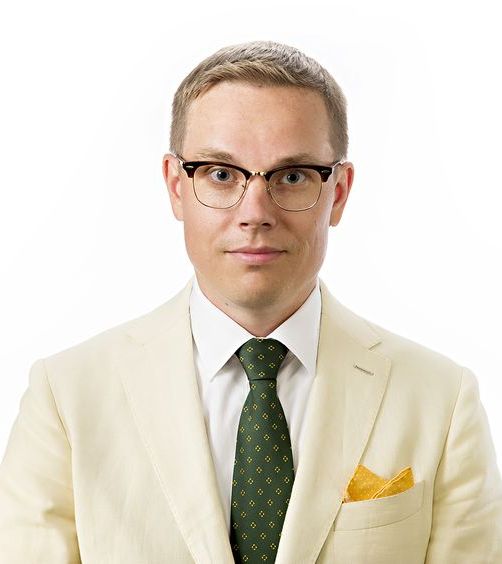 Markus currently works as a Postdoctoral researcher in the University of Tampere, in the School of Management. Markus has his own project “Rethinking the framework of sustainability: sustainability transition and food consumption”.
Markus currently works as a Postdoctoral researcher in the University of Tampere, in the School of Management. Markus has his own project “Rethinking the framework of sustainability: sustainability transition and food consumption”.
Markus has a PhD in Economic Sociology from the University of Turku, an M.Sc. in Economics from University of Tampere and an M.Sc. in Environmental Biotechnology from the Technical University of Tampere. He has also studied behavioral economics at the University of Groningen in the Netherlands. In January 2013 he received an Adjunct professorship from the University of Turku in the field of economic sociology with the specific field being sustainable development and consumption. For more information see: http://vinnari.fi/
Dr. Zipporah Weisberg (Spain) 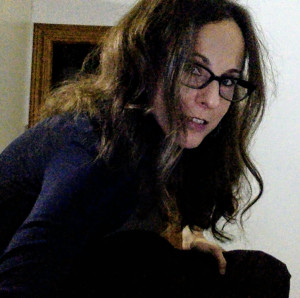 Zipporah Weisberg is an Independent Researcher living in Granada, Spain. In 2013 Zipporah completed her Ph.D. in Social and Political Thought at York University. From June 2013 to June 2015 Zipporah was the Abby Benjamin Postdoctoral Fellow in Animal Ethics in the Dept. of Philosophy at Queen’s University in Kingston, Ontario. She specializes in critical animal studies, critical social theory, and existentialism and phenomenology. Zipporah’s notable publications include, “‘The Simple Magic of Life’: Phenomenology, Ontology, and Animal Ethics” (Humanimalia Fall 2015); “Biotechnology as Endgame: Ontological and Ethical Collapse in the ‘Biotech Century’,” (NanoEthics, March 2015), “The Trouble with Posthumanism: Bacteria are People Too (Thinking The Unthinkable: New Readings in Critical Animal Studies, edited by John Sorenson. Toronto: Canadian Scholars Press, 2014), and “The Broken Promises of Monsters: Haraway, Animals, and the Humanist Legacy” (Journal for Critical Animal Studies, 2009).
Zipporah Weisberg is an Independent Researcher living in Granada, Spain. In 2013 Zipporah completed her Ph.D. in Social and Political Thought at York University. From June 2013 to June 2015 Zipporah was the Abby Benjamin Postdoctoral Fellow in Animal Ethics in the Dept. of Philosophy at Queen’s University in Kingston, Ontario. She specializes in critical animal studies, critical social theory, and existentialism and phenomenology. Zipporah’s notable publications include, “‘The Simple Magic of Life’: Phenomenology, Ontology, and Animal Ethics” (Humanimalia Fall 2015); “Biotechnology as Endgame: Ontological and Ethical Collapse in the ‘Biotech Century’,” (NanoEthics, March 2015), “The Trouble with Posthumanism: Bacteria are People Too (Thinking The Unthinkable: New Readings in Critical Animal Studies, edited by John Sorenson. Toronto: Canadian Scholars Press, 2014), and “The Broken Promises of Monsters: Haraway, Animals, and the Humanist Legacy” (Journal for Critical Animal Studies, 2009).
Dr. Richard White (UK) 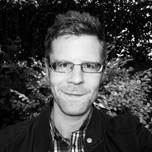 Richard J. White is a Reader in Human Geography based at Sheffield Hallam University, UK. A significant part of Richard’s teaching, research, and writing seeks to develop anarchist praxis within human geography. In this context Richard’s long-term contribution with critical animal studies, and more recently within critical animal geographies, has been to demonstrate how foregrounding anarchism and a politics of total liberation can help (a) problematise human power and human species identity and (b) confront, challenge and subvert the often exploitative and violent interlocking systems that underpin the treatment of both humans and other animals in society. Richard has recently co-edited Anarchism and Animal Liberation (2015, McFarland Press) and contributed chapters to Critical Animal Geographies (2014, Routledge) and Defining Critical Animal Studies: an Intersectional Social Justice Approach for Liberation (2014, Peter Lang Publishing Group). He was the Editor-in-Chief of the Journal for Critical Animal Studies between 2009-2012. Email: Richard.White@shu.ac.uk
Richard J. White is a Reader in Human Geography based at Sheffield Hallam University, UK. A significant part of Richard’s teaching, research, and writing seeks to develop anarchist praxis within human geography. In this context Richard’s long-term contribution with critical animal studies, and more recently within critical animal geographies, has been to demonstrate how foregrounding anarchism and a politics of total liberation can help (a) problematise human power and human species identity and (b) confront, challenge and subvert the often exploitative and violent interlocking systems that underpin the treatment of both humans and other animals in society. Richard has recently co-edited Anarchism and Animal Liberation (2015, McFarland Press) and contributed chapters to Critical Animal Geographies (2014, Routledge) and Defining Critical Animal Studies: an Intersectional Social Justice Approach for Liberation (2014, Peter Lang Publishing Group). He was the Editor-in-Chief of the Journal for Critical Animal Studies between 2009-2012. Email: Richard.White@shu.ac.uk
Dr. Nikoleta Zampaki  is a Post-doc Researcher, Faculty of Philology of the National and Kapodistrian University of Athens, Greece. She was Instructor at the Utah University in the U.S.A. Her disciplines are Environmental Humanities, Posthumanities, Digital Humanities, and Comparative Literature. She is editor and reviewer at many journals overseas, Associate and Managing Editor at the Journal of Ecohumanism, and current member of Education Team of NASA, V.I.N.E.-Glenn Research Center. She has also participated in many conferences and she is a multilingual student by working on English, French, Romanian, Russian, Chinese, Hungarian, Maori, and Turkish. She is also co-editor with Professor Peggy Karpouzou of the book series “Posthumanities and Citizenship Futures” at Rowman & Littlefield, and “Environmental Humanities” at TPLondon based in the U.K.
is a Post-doc Researcher, Faculty of Philology of the National and Kapodistrian University of Athens, Greece. She was Instructor at the Utah University in the U.S.A. Her disciplines are Environmental Humanities, Posthumanities, Digital Humanities, and Comparative Literature. She is editor and reviewer at many journals overseas, Associate and Managing Editor at the Journal of Ecohumanism, and current member of Education Team of NASA, V.I.N.E.-Glenn Research Center. She has also participated in many conferences and she is a multilingual student by working on English, French, Romanian, Russian, Chinese, Hungarian, Maori, and Turkish. She is also co-editor with Professor Peggy Karpouzou of the book series “Posthumanities and Citizenship Futures” at Rowman & Littlefield, and “Environmental Humanities” at TPLondon based in the U.K.
